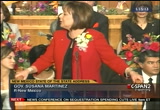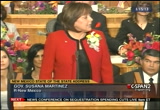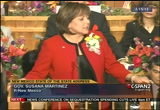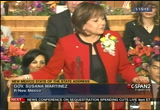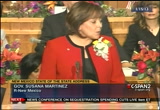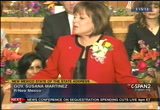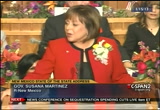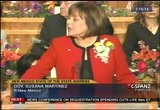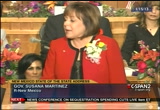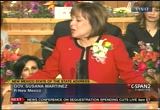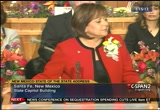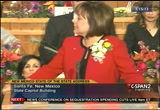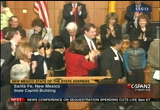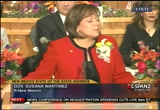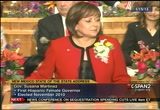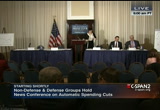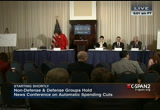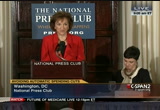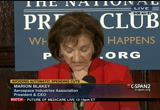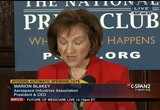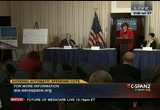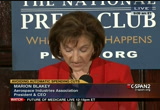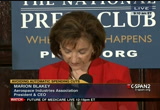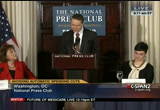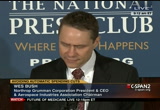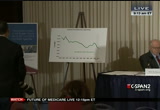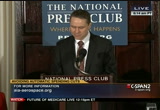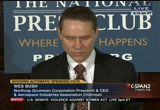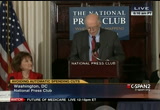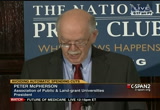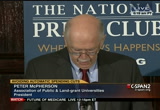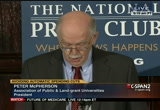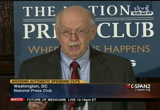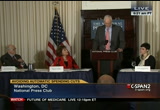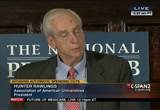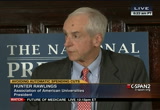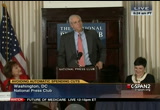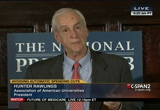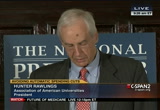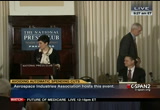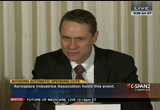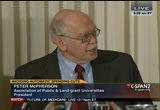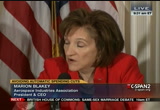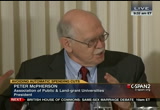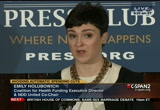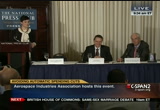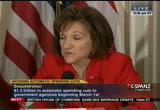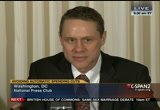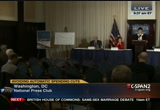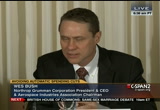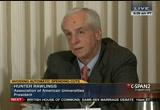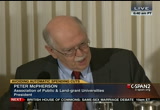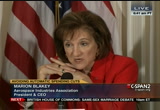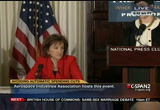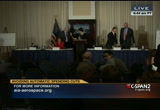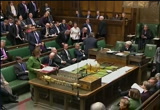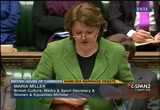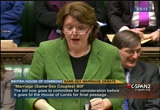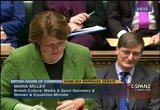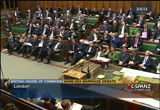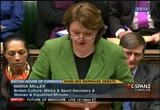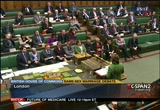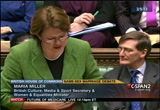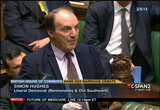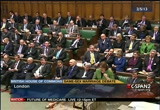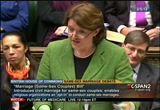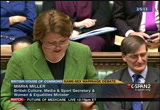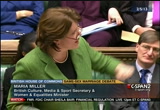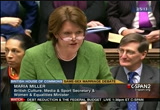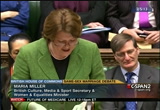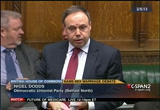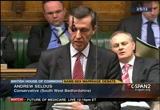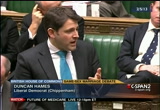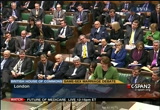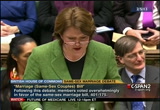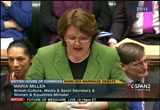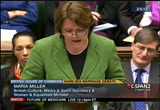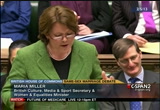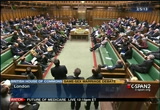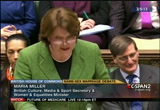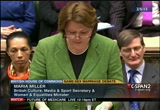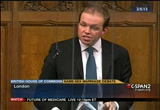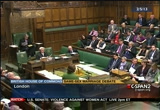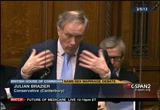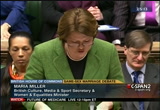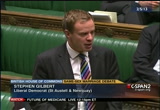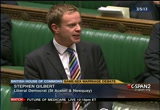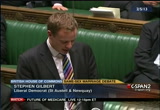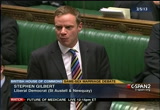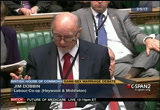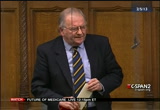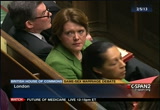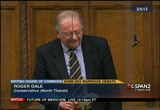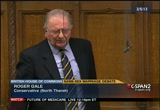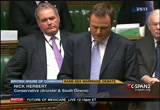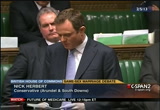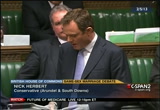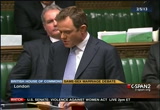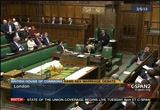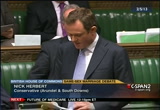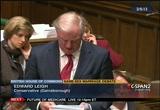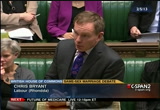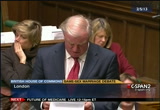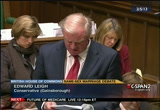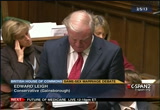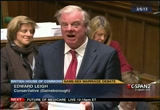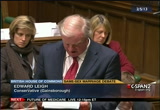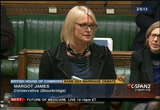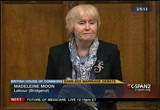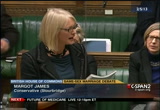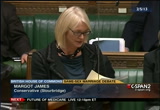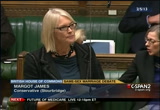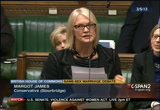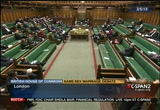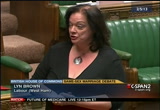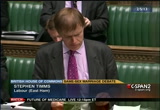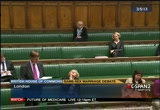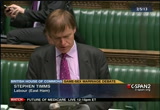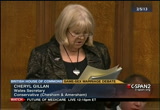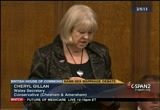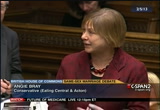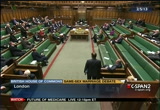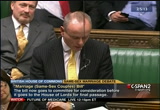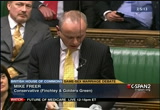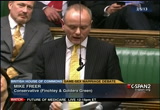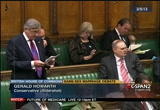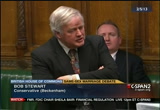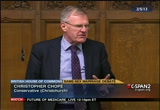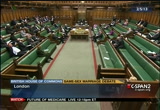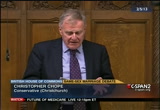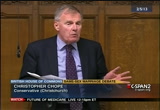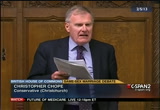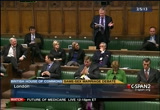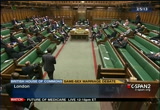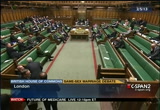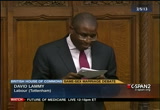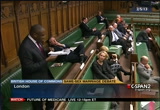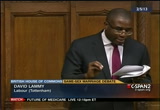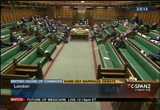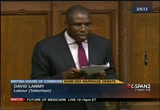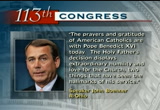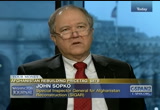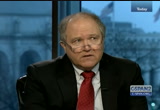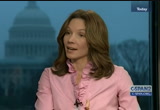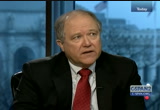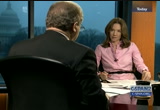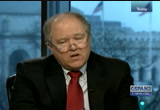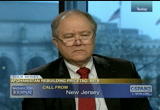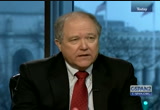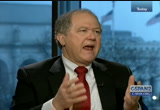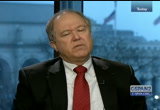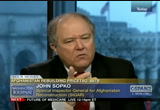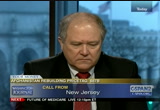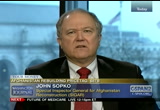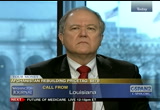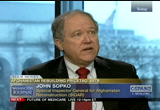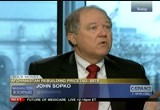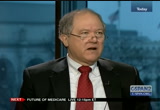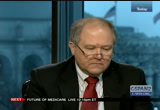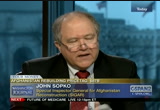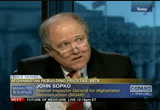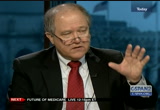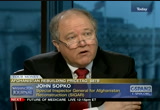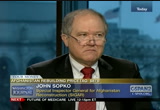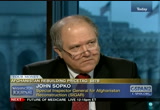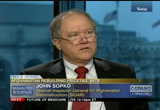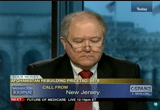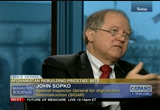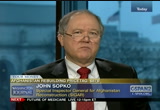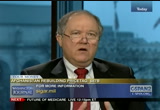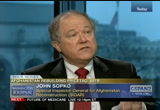tv U.S. Senate CSPAN February 11, 2013 8:30am-12:00pm EST
8:30 am
two years ago the largest structural deficit in our budget was faced by new mexicans in the history of new mexico. skeptics said we could not balance the budget without east a massive -- without either a massive tax increase or making deep cuts to classroom spending and to medicaid. but we came together in a bipartisan manner, and together we proved the skeptics wrong. [applause] for two years in a row, we compromised and passed good, balanced budgets. we protected critical priorities like classroom spending and basic health care for the most vulnerable. we protected childcare for working moms, school clothes for
8:31 am
kids in need. and let's remember we accomplished all of this without raising taxes. [applause] not only did we eliminate the deficit, we created a surplus. this wasn't a republican accomplishment or a democratic accomplishment. it was an accomplishment we achieved together. the next year we used those surplus tax dollars wisely. we put some in our state savings account, increasing our reserve levels. we used some to increase funding for education, targeting reading and early childhood initiatives. we used a portion of the surplus to cut taxes, to create more jobs by curbing the double and triple taxation in construction and in manufacturing. and we provided a tax credit to
8:32 am
help small businesses hire those who deserve jobs the most. our veterans returning from afghanistan and iraq. [applause] we have seen some encouraging signs in our economy. tourism is on the rise. with more growth in visitors to new mexico than was expected in arizona or colorado. we are building our state's strongest-ever relationship with new mexico border governors focusing on developing a border region near santa teresa creating jobs. major companies are once again looking at new mexico. including two companies in the aviation industry that are relocating their headquarters to albuquerque. [applause]
8:33 am
the manufacturing sector is growing once again, and in the last two years new mexico exports have doubled amounting to more than $2 billion, meaning that in one year our export growth jumped from 38th to 3rd in the nation. [applause] but we still have much work to do. the state of our state is getting stronger. but i've always promised to be straight with you. it's my job to say when trouble is on the horizon. allow me to take a moment to describe the challenge before us. the national economy is stagnant, and the federal government on which our state has become so dependent over the years is faltering. weighed down by $16 trillion in
8:34 am
debt. while new mexico has seen some job gapes in certain private -- job gains in certain private sector industries, there is no question that the number of government jobs is on the decline. last year new mexico lost more than 4,800 government jobs. 400 federal jobs in a single month. on top of that, many private sector companies that contract with the federal government have seen those contracts cut costing us more jobs. unfortunately, it doesn't look like washington, d.c. is going to solve the budget problem anytime soon. it's the fault of both parties, and can it's hurting -- and it's hurting new mexicans. i am committed to working with our delegation to protect our labs and military bases fighting to avoid further cuts.
8:35 am
our labs and our bases are not only important to new mexico, but they're critical to the security of america. however, with a federal government that is so far in debt, so dysfunctional we'd be foolish to leave our state's economy at the mercy of the next fiscal cliff in washington. the opportunity to forge a new path and shape our own destiny is before us. an opportunity defined not by decisions made in washington, but by the hard work and ingenuity of new mexicans. [cheers and applause] and that means diversifying our economy and growing the private sector. [applause]
8:36 am
new mexico has a lot to offer. what we lack is a level playing field with our surrounding states. we're simply not competitive. i have always said that ao; government doesn't create jobs, businesses do. but i do believe that governmen; has an important role to insure a level playing field so that new mexicans can compete fairly. unfortunately, right now the playing field is tilted against new mexico. and it's pushing jobs to other states. we are in a global economy. business will locate and grow where they have the best opportunity to succeed, to get a fair shake where they aren't overtaxed and where they can find the best-trained workers. our goal this session should be to make new mexico more competitive. [applause] to level the playing field so
8:37 am
that our small businesses can grow and put more new mexicans back to work. and there are, essentially, two areas in which we should concentrate. instituting a fair tax and regulatory structure and creating a world class work force through common sense education reform. [applause] one way to make new mexico be more competitive is to lower the business tax rate from 7.6% to 4.9% just as arizona has done. [applause] right now we have the highest in the southwest. i'm not asking to take the rates to zero as other states have dope. i'm propose -- as other statesé have done. i'm proposing a reasonable, balanced approach, and a 4.9%
8:38 am
puts new mexico in the game. [applause] and if a new mexico company wants to make and sell goods to every corner of the world, we shouldn't punish them with our tax structure like we to now. we should adopt a single sales factor just as 25 other states have done in america. [applause] and to insure our veterans stay in new mexico when they retire, to start a second career, maybe open a small business, i am proposing we exempt their retirement pension income from state taxes. [applause] they fought for us. [applause] and we --
8:39 am
[inaudible] and we should fight and insure they make new mexico their home. [applause] and while the large employers always dominate the news, we must never forget about our new mexico small businesses. last christmas i received a letter from misty castro. misty owns a small business, castro's barber shop, and was facing some really difficult choices; stay open and hope things turn around or close her doors after 11 years in business. she puts her heart and soul into that business, and she was at her wit's end. i wrote her back to encourage her. this christmas i received another letter from misty that i'd like to read in part to you. she says: i was planning tonwnw close the doors and move on.
8:40 am
you took the time to write back with such kind words s and you placed a small card that simply said "i believe in you." when i start to feel overwhelmed and down, i look at my little "w believe in you" note, pick my head up and keep going. knowing someone believes in me makes it much easier. we need to make sure all small business owners know we believe in them. that's why i'm proposing that we give every new mexico small business a 1,000 tax credit for every job created and retained over the next two years. in these uncertain times, if a small business owner is willing to take the risk to invest in a new job, then we should stand with them. [applause]
8:41 am
but competing for jobs goes further than just common sense tax policy. we need to partner with our small business owners, help them hire and train new workers now. this is why i'm also requesting a $4.75 million investment to further the success of our job training incentive program or jtip. this is a partnership with small businesses to help them train new i employees -- new employees, encouraging more hiring. i'm also asking the legislature to pass job-creating infrastructure projects, projects like the -- [inaudible] expansion. we passed last is the last session our water system roads and dam repair. these types of projects create immediate jobs to kick start our economy while also building the infrastructure that is necessary
8:42 am
for long-term economic development. and when we invest in local projects, let's make sure that they're vetted, that they're prioritized and that they're fully funded. we must also protect the public's investment we've made so far such as space port new mexico. taxpayers have already spent more than $209 million in this venture, but now we risk losing this investment. the states competing with us for space port business has passed a bill protecting companies from lawsuit abuse. and because we didn't pass this last year, a company called xcor prks aerospace chose to locate in texas over new mexico. again, it's about competition. let's protect our investment in
8:43 am
space port and pass lawsuit abuse reform this session. [applause] i'm particularly hopeful that we can pass these reforms to helpño our businesses compete because many of them face the daunting challenges imposed by the new federal health care law. i didn't support obama care, but it's the law of the land, the election is over, and the supreme court has ruled. my job is not to play party politics, but to implement this law in a way that best serves new mexico. [applause] that's why last week i announced we will expand medicaid to cover up to 170,000 more low income new mexicans. [applause]
8:44 am
it was the right thing to do. it means expanding the health care safety net to more of those in need, moving care from costly emergency rooms into primary it does not jeopardize the budget outlook. in fact, given our unique population and programs we can expect revenue increases that offset the cost of providing these services. but i've been clear, medicaid expansion is a federal government commitment. and if they should ever break their funding promise, new mexico will not pick up the burden of adults most recently added to the program at the cutting health care for new mexico kids. i will not let those kids pay the price. [applause]
8:45 am
another way new mexico can level the playing field and become more competitive is to place a high etch sis on developing -- emphasis on developing our work force. we know that only 63% of our students are graduating within four years, only 63 be %. 63%. 67 children drop out each and every school day.
8:46 am
>> we have an obligation now to focus on raising our graduation rate, and better prepare our high school students for new mexico's workforce or for college. [applause] >> let me tell you about a program called the bridge. existed between the needs of a 21st century economy and the preparedness of high school graduates in dona ana county. it's a partnership between the local business community, their community college and state university, and their public schools. state's first early college high school. the school is located on land
8:47 am
donated by new mexico state university, and it offers dual credits that are accepted by dona ana community college. every student who will graduate from this school not only earns a high school diploma, but they also earn an associate's degree and, in some cases, a work-ready certificate. that student is ready to be hired. [applause] today, we are issuing an achievement award for one of the bridge students, maria guadalupe carillo. maria is the first person in her family to attend college. as a high school junior, maria has already earned 48 college
8:48 am
credits. school program, she will enter congratulations, maria. new mexico is proud of you. [applause] since the bridge program has been operating, not one student has dropped out. [applause] and let's remember, 78% of the students are hispanic, an incredible 63% are first-generation college students, and 43% come from low-income families. [applause] this is one tool helping the las cruces graduation rate rise from 51% to 72% in just the last four years.
8:49 am
this session, i'm pursuing a plan to take that bridge has accomplished in dona ana county and bring it to other areas of new mexico. [applause] for students looking to attend college, i'm asking the legislature to embrace several other reform opportunities for our high school students, $2.5 million to expand advanced placement courses to provide ap test waivers for low-income minority students, and to train more ap teachers so that every child in new mexico has the opportunity to get a jump-start on college. and a new statewide dropout warning system. teachers identify students who are at risk of dropping out long before they reach high school.
8:50 am
because when we talk about reducing our dropout rate, we need to tackle the root causes head on. [applause] a recent study found that 88% of high school students who drop out were not proficient readers i have had the privilege of visiting thousands of new mexico kids in classrooms. i've told you about sitting crisscross applesauce on the floor and reading to those little ones. i ask them, what do you want to be, what do you want to do? that's why i think of those kids when i think of our dropout
8:51 am
we all know there are a lot of grade. that's why i believe so strongly in early childhood literacy. and why i believe we must do all we can to ensure new mexico's children can read by the 3rd grade. last year i was pleased to make permanent the k3 plus program, a program that helps struggling students with additional instruction and more help. pre-k. our reforms are being recognized nationally. new mexico has competed for the
8:52 am
federal race to the top funding, seeking money that will be basics. are one of only 14 states to b awarded this funding. more children in new mexico get the help they need in early education. and while we're making progress, we are still a long way from the obama's education secretary arne students keep being allowed to leave third and fourth grade are not doing them any favors. reading enables a child to chase his or her dreams.
8:53 am
i want to introduce you to a young boy named jamal. jamal, stand up for us please. [applause] jamal is a first grader who wrote a book for a specia project, and he wrote this book through the albuquerque chamber of commerce is reading program. i didn't invite them up here just because of his book and the title which is the governor rocks -- [laughter] all that certainly didn't hurt anything. [laughter] but the reason i invited him is because of one key passage that jamal wrote in that book. jamal, will you please read it? >> i like to read.
8:54 am
8:55 am
reading paves the way for success. we must intervene early and do all we can to help struggling students. but i believe if a child is still unable to read by the third grade, after all those interventions, then it's far more compassionate to have that child repeat that level, to get them up to speed, than to simply pass them onto the next grade and make them four times more likely to become a drop-out. there have been many compromises made to this bill, including more funding for intervention and increasing parental involvement. we've had compromised. it's been sponsored by democrats and passed by both chambers. and you heard what the obama administration said. so let's stand together and pass this bill. [applause]
8:56 am
with last year's new mexico reads to lead investment, we hired reading coaches and were able to train nearly 2 thousand educators in methods proven to produce better readers. this year i propose we expand the new mexico reads to lead program from $8.5 million to $13.5 million. our focus is on struggling schools, on offering a hand-up to those who need help. that's why i'm proposing $4.7 million in school turnaround programs to close the gap between high-performing schools and schools that are struggling. as we improve academic performance in new mexico, we cannot overlook the crucial role other school leaders play in this effort. teacher can give a child is
8:57 am
8:58 am
on free and reduced lunch, i a school that is 100% hispanic and 60% that is considered english your second language is not in the top of of our schools. not in the top third. instead, out of 831 schools, this elementary school is ranked fifth in the entire state. [applause] and we have with us today several teachers, school leaders, and kids from anthony. let's welcome principal lind
8:59 am
peres. [applause] second grade teacher orlanda palomares. [applause] sixth grade teacher letici gonzález. [applause] and students columbus, bryan, kayla, diego, and alex. [applause] i am so so proud of you. thank you for all that you are achieving. congratulations. >> representatives from nondefense and defense groups hold a news conference regarding the upcoming automatic spending cuts known as sequestration. speakers representing the defense industry include aerospace industries association president marion blakey, and
9:00 am
northrop grumman president and ceo wes bush. also providing remarks from the nondefense sector will be the executive director of the coalition for health funding and the heads of the association of public and land-grant universities, and association of american universities. automatic spending cuts of $1.2 trillion are set to go into effect on march 1. this news conference is being held at the national press club in washington, d.c. >> [inaudible conversations]
9:02 am
>> [inaudible conversations] >> spent welcome and good morning, everyone. i'm emily holubowich, executive director of the coalition for health funding and co-chair of ndd united, representing the full breadth of interest in nondefense discretionary programs. ned programs our core government functions provided for the benefit of all, including safety, law enforcement, education and job training, veterans services, medical and scientific research, weather monitoring and environmental protection, natural resources, housing and social services, and transportation and infrastructure. ndd united is please and i to join with the aerospace industries association in this unprecedented effort to stop sequestration and find a balanced approach to deficit reduction that does not include
9:03 am
further cuts to discretionary programs. both defense and nondefense programs are equally critical to economic growth and the safety and security of our nation. these discretionary programs are not the reason for our growing debt. and yet so far they have been the only place lawmakers have been willing to cut, by $1.5 trillion to date. nondefense programs alone have been cut by $900 billion, bringing spending obese programs to levels not seen since eisenhower was president. as was often a white house memo on friday, and as you hear from our panel today, cuts to discretionary programs alone not only don't balance the budget, they will cripple our ability to grow our economy and provide an environment where all americans have the opportunity to lead healthy, safe and productive life. that's what brings us together here today, because sequestration is about more than
9:04 am
numbers on a ledger. they are real people behind these numbers and their lives and livelihoods are on the line. these cuts have consequences, and every american will pay the price. with fewer food inspectors will be more susceptible to foodborne illness. will be a greater risk of deadly disease outbreak as public health laboratory schools. with fewer air traffic controllers, flights will be curtailed. classroom size will increase as teachers are laid off. national parks will close. we will be less safe with fewer police on the streets, and we will wait longer to cure debilitating diseases like cancer and alzheimer's. today, ndd united is sentiments of congress and the white house a 72 page letter signed by 3200 national, state and local organizations, including those represented here today, to stop the political brinkmanship come to stop cutting for cutting say,
9:05 am
and to start working together on a balanced, meaningful solution to our nation's debt. i would hav now like to invite r panel to share more detailed about the devastating impact of sequestration on defense and nondefense programs. we will take questions at the end of the presentation. and full bios for all of our speakers are available in your guest packet. we will begin with marion blakey, president and ceo of the aerospace industries association. i personally want to thank marion for the associations support of ndd united, and her leadership in bringing the fans and nondefense together for the first time under one big text. marion. thank you, emily. i can tell you how pleased we are to be your altogether to be talking about such an important topic. i am marion blakey, president
9:06 am
and ceo of the aerospace initiative association, and we're very proud to represent the 1 millionth heidi steele and dedicated professionals who make up the aerospace and defense workforce. let me get right to it. i'm making a few comments about this crisis that we are facing. sequestration is a poison pill designed to force the hard but necessary decisions, the work of governing, compromise, negotiation, to reduce our deficits and our debt. but the poison pill now threatens to have a toxic effect on our entire economy, and on our national security. we've been seeing the flashing warning signs, flashing code blue that massive indiscriminate cuts in defense and other important functions of government truly do threaten our security, undermine our ability to stay ahead in the global innovation race, and will taint
9:07 am
our fragile economy. we have been saying this for months, and the latest wakeup call was just the other day when we learned that our gdp is, for the first time in four years, going into negative territory. that's a serious wakeup call. the ongoing defense downturn has real world consequences right now. both for reducing our military might and our economic potenti potential. and we pointed out that other government functions are affected as well. for example, faa's operation of the national aerospace system, nasa's space exploration program, and no was work on necessary new satellite, weather satellite program. these are sequestration's negative impacts and they raise
9:08 am
will be on national security. the diverse group of leaders with us today are going to be a testing to this. we are going passionate about six month ago we released a study conducted by doctor stephen forte of george mason university. the study's methodology has found and in its conclusions are grim. the study says that sequestration if it goes forward will put 2.1 million jobs at risk. these are defense and nondefense related jobs, and they include nearly 1 million small businesses. what caused the unemployment rate to rise by 1.5% and reduce expected gdp growth by $215 billion, 215 billion. the latest congressional budget office forecast, cbo, reinforces
9:09 am
his conclusions that sequestration will significant undermine u.s. sustained growth. so, today, we are really releasing doctor for study and his analysis of these potential economic impacts of sequestration across the nation. let it be noted, no one can say that they were not forewarned about the full consequences of this very bad policy. and this morning, to emphasize the urgency of the situation, we will be delivering to literally every member of congress and the white house a letter signed by nearly 140 of our ceos. this is in addition to the letter that indeed he is doing, andy dick unite will be living as well. these are the ceos of aerospace defense companies and urging congress and the president to work now on a balanced bipartisan solution to
9:10 am
sequestration. the letter states, as currently planned, sequestration will have a serious negative impact on the economy, national security, and federal agencies. in the current fiscal environment, we understand that defense spending must be part of any conversations about federal budget priorities. however, a lot of sequestration to occur is neither responsible nor is it strategic. the letter of firms our conviction, that congress and the white house can work together to make certain that any -- your debt and deficit problem is not worse than the malady that we're trying to fix. we are realistic enough to know that our voice alone won't end this debate, but as evidenced by this unprecedented gathering of disparate groups, i'm gratified
9:11 am
that our course of voices is clearly gathering strength. i'm confident that together we can win this battle. now, let me ask wes bush, the chairman of aerospace indices association and the chairman and ceo and president of northrop grumman corporation to make a few remarks. wes. >> thank you, mary and. as we think about sequestration, this is really a decision, decision that our nation's political leadership need to make and the timeline is rapidly approaching for the conclusion of that decision. i thought it would be helpful to frame a decision space in the context of the broader u.s. economic model. our economic model here in united states works best when we have all of the pieces of that model working together. and the premise of our model is that there are certain roles that are best performed by
9:12 am
companies, such as ours, there are certain roles best performed by government. there are certain roles in a very critical roles, played by other enterprises in our society, such as educational institutions, nonprofit organizations, any other enterprises. central though to that model, central to the functioning of our economy is investment by the federal government in some key areas, such as providing for our national security, supporting education, and supporting research that fuels the innovation that our economy needs for our long-term growth. supporting and providing for the public safety and for public health. there are many roles. these are all critical functions of government. the funding for these core functions of our federal government is provided by the discretionary component of the federal budget.
9:13 am
and while total federal spending represents about 23% of our gross domestic product, the discretion a component of spending is only about 8% of gdp. the remaining components of federal spending our entitlements represent about 14% of gdp, and interest payments on the debt, which are about 1.4%. if we look at discretionary spending as a% of gdp over time, and i would draw your attention to the chart just over here peters right, we already are on a track to be at the lowest point of discretionary spending in relation to our national economy in 50 years. this drastic changes happening already without sequestration. and let me emphasize that. this chart shows what's happening to discretionary spending without sequestration. already we are slowly backing away from a long-term investments in our security, our
9:14 am
research, our education, our infrastructure, our public health, our public safety, and many of the core functions of government. now, that level of decline cannot be sustained if america is to be a global leader for the long-term. and that's why we are all here together this morning, to really make sure there is clarity around the decision on sequestration. trying to solve our countries very serious fiscal challenges, and we all know they're very serious challenges, but trying to solve those issues solely on the back of the discretionary budget is the wrong answer for america. we need our congress and the administration to work together to create a balanced approach to reducing our long-term debt. now, will the discretionary budget play a role in the solution? of course it will.
9:15 am
but allowing the sequestered to occur is absolutely the wrong way to go about this. and it would produce a fear, economic consequences in both the near-term and long-term care the loss of jobs if our country struggles among recession would be a real setback for our economy. the loss of small businesses across america would drain us, not only of their employment and economic contributions, but also their innovation and their growth potential. the impact, the very real impact on university research and student aid would haunt us for many, many years. and the index on a public health and safety are simply unacceptable. so we have come together to help illuminate how serious is the question would be across our country, and we're here to talk for action, we are here to call for our political leadership to come together, to act to stop
9:16 am
sequestration and come up with a solution that will continue to help america grow for many, many years. thank you. >> thank you so much. i would now like to introduce our next speakers, from the task force for american innovation and also important partners in ndd united. they will share more of the impact of nondefense discretion spending cuts on education and scientific innovation. we will first hear from peter mcpherson, president of the association of public and land-grant universities. and then we'll hear from hunter rawlings, president of the association of american universities. >> well, thank you and good morning. as joe said, i am president of apl you which is approximately 200 public research universities around the country. previously served as deputy
9:17 am
secretary of treasury come sometime ago working at some of the issues that we are talking about here today. i'm delighted to be here with my colleagues, science, higher education, industry, and as was mentioned in hunter rawlings and i are also a representing the task force on american innovation, which is a very broad coalition of industry, academy and scientific societies. we are not always on the same page, not usually fighting but, frankly, not united in the way that we have been around this issue. we all see the urgent need am the problem we have before us. sequestration is a reckless tool that would force these reductions across critical investments in r&d and education. i'm here to say that sequestration would greatly
9:18 am
reduce and harm our nation's -- our nation by slashing its capacity. research has been a primary driver of u.s. economies for generations. basic research has been the wellspring for innovation, producing much of our model society, including internet, gps, large-scale integrated circuit, and so much more. the federal government funds 60% of the basic research, much of it two-thirds of it going to universities. without that basic research, my industry colleagues here i know, depend so heavily upon it. sequestration cuts about 10 million -- 10 billion of r&d in 2013. going through 2021, the full sequestration would cut r&d by about 90 billion, and reduce gdp growth, depending upon your
9:19 am
study, 330 billion, it says a study that was just completed by information technology innovation foundation. these figures are a little bit apart, depending upon the study, but they all our massive moreover, the same report i mentioned talks about 200 fewer jobs in just a four year period. again, the study figures can very some but they're all pretty dramatic. in short, is penny wise and pound foolish to make these cuts of r&d that yield far more than what they cost. even if we don't invest enough in invest enough in research, some other country will. china, for example, is not the only example, is rapidly --
9:20 am
china's gdp of course is smaller than united states, but its economy is growing much faster. and by some calculations, their total exports imports are roughly equal to what ours are today. unless we act, we can expect that china's increasing research funding and the funding of others will mean that the relative competitiveness of the u.s. will weaken probably in ways that go to our historical core strengths. sequestration is unnecessary, and it's unavoidable. we absolutely must deal with the budget deficit, but this massive indiscriminate type approach are counterproductive. such cuts will dampen growth, and thereby reduce tax revenue. such cuts definitely are not
9:21 am
usually good for the deficit long-term. we are less than three weeks away from having these massive cuts. i'm here to join others in urging president obama, congressional leaders come together for the sake of america's future and in the sequestration. together, we before you are united in our efforts to ensure that america maintains its place in innovation and research. thank you for all being here. >> good morning, everyone. i'm hunter rawlings, representing the aau, the association of american universities, which comprises 60 of the leading research universities in the u.s. as peter said to me and i are also representing the task force on american innovation, and gentlemen are in a press packet from the task force that i hope you will take a good look at.
9:22 am
the sequestered is most unpopular thing in washington, d.c. since the dallas cowboys. [laughter] it's mindless and will cause great harm to our country. the president hates it. speaker boehner hates it. majority leader harry reid hates it. and they created it. imagine how the rest of us feel about it. yet, somehow our leaders can't seem to figure a way out of it. we all agree that country needs to find a more sustainable fiscal path. in my view we need to balanced approach. as wes said a few minutes ago, that includes both spending and revenue. cuts in spending should focus on programs that are growing the most. not on discretionary spending, which is not growing. it's not the problem and yet has already borne the brunt of cuts. discretion spending is a part of the budget where america's
9:23 am
future lies. it includes such investment as research and education. cutting investment in our future is not the way to solve this problem. yet, that's exactly what the sequestered will do. there's a better way. we've talked quite a bit here today about the impact of the sequestered on an economy that is still recovering. i want to focus on the longer-term, the economy and the nation that we will lead to her children, our grandchildren, and great-grandchildren. the research that is being cut, so severely by the sequestered, affects the long-term health, quality of life, and economic and national security of our coming generation. it's how we figure out clean forms of energy, make medical advances that save lives, and ultimately reduce the cost of health care. develop the technologies that defend our country and make our fighting men and women safer and advance our economies.
9:24 am
more than half, more than half of economic growth in this country since world war ii has resulted from technological. none of which would've been impossible or almost none of which would've been possible without the basic research funding by the federal government. sometimes this all sounds very theoretical, but we lived every day. let me hold up for you this morning this fetching little iphone. you can't get along without this thing. you all have one in your pocket. or perhaps you're looking at right now and not listening to me. [laughter] which by the way is pretty standard for us professors, so it's not surprising. this device that you have in your pocket and i have in mind, would not exist were it not for federally funded research. let me show you why.
9:25 am
the gps that enables your device to guide you to your destination would not exist without federally funded research that would reduce the atomic clock. so apple made this thing, and they did a great job. but without the atomic clock, it doesn't work. a touchscreen, an amazing thing, even i, a professor, can use it, came directly from research funded by the national science foundation. we don't think about that. the liquid crystal display or lcv monitor, used on these phones comes from research funded by nih, the national institutes for health. the rechargeable lithium-ion battery that runs these phones came out of basic research funded by the department of energy. and even the integrated circuit, ma whic which you find in practy all electronic equipment, benefited from federally funded research, as well as from great
9:26 am
skill by industry. so this device that we all can't get a long with, came to a great extent from federally funded research. these things can't keep coming if we don't invest in basic research. that's why it has strong bipartisan support in congress, and why president obama is such a strong advocate for it. but the reality of the federal budget is that discretion spending from which we fund this research is getting squeezed tighter and tighter. and now the sequestered cuts nondefense discretionary spending by 5% this year alone, which is really 9% given where we are in the year. the omb says that it would force the national science foundation to issue nearly 1000 fewer research grants, curtailing the work of an estimated 12,000 scientists and engineers. it would require the nih to make
9:27 am
100 your research awards. finally, in addition to research, as wes and peter have already mentioned, the sequestered would hurt students and financially. it would cut a work study and other financial aid programs. why would we penalize young americans working their way through college? what kind of message does that send? it is not a message of opportunity. so the sequestered, instead, a stupid to it is shortsighted, and it should not happen. we urge the president and the congress to stop the sequestered and address our fiscal challenges in a balanced, sensible way. thank you. >> thank you so much, peter and hundred. now i'd like to open it up for questions from the audience. if you could please state your name and affiliation. i believe we have a microphone.
9:28 am
we are being recorded, so it would be helpful if you could speak into the microphone. and let's begin. >> hello. paul, roll call group. mr. rawlings said that he favors a balanced package including revenues. i'm going to give you all agree with that, or some of you think that revenue should not be included. >> i can serve as bait for aerospace industries association, and marion as well, and i think all of our member companies. we have long called for a balanced approach to solve our nation's fiscal issues we know you can't just pull one lever. you have to reach and pull all of the lovers available to our nation to deal with this. unfortunately, what we've seen today has been primarily, you can see on the chart over to the
9:29 am
right, a polling of the lever on the discretionary budgets. we think this has to be much more balanced. so yes, everything has to be on the table to make sure we make a good decision about the future of our country. >> i think, i think all of us believe, hunter and i have long been on record on this, there needs to be a balanced approach, and that's really what we have to do the work through the regulatory budget process, we hope in congress in the months ahead. the struggle we've got right now is how do we deal with sequestered right now. and that's a lot more complicated as we have included got the details on how to do that, but what we do know is this counterproductive for the long-term situation of the country, including the deficit,
9:30 am
depending upon how you look at that, to have sequestered go forward. >> and i would just add for ndd united, for the record i am not in congress but agreed with a lot of comments right, and a lot of them say from simpson-bowles to domenici-rivlin we need a balanced approach of spending cuts and revenue. i can tell you that right now what we've seen is an unbalanced approach. we've had two and a half dollars cut for every dollar in revenue. if sequestration were to take effect, that ratio would go $5 in cuts to every 1 dollar in revenue. clearly not a balanced. so we're hopeful in the next few weeks we can see a more balanced approach to avoid sequestration and put our nation on a more sustainable fiscal path.
9:31 am
>> again, this is a long-term goal. we've got to figure how to deal with the whole picture over the next few months. spent charley with government executive what has been the reaction from mostly house republicans who were against the revenues, listening to what you all are saying? >> yes, i think that, you know, one of the things that we have to understand here is that to have the kind of compromise that has lasting effect, it's got to be bipartisan. and that means that we are asking both sides, and i think we're seeing evidence, that both sides of the aisle are listening without question. we also are pointing out that the area that really has not been considered so far seriously is the question of entitlement
9:32 am
spending an and entitlement spendingcome as a bit of an understands, is a very fundamental part of how you solve this equation. and certainly both sides, but it's important for others on he'll be on the house republicans, to listen to that as well. so there are several factors to this solution. >> i think is very line of questions, which is certainly appropriate, and our need to respond to questions reflects some of the problems we've got. we've got to deal with this immediate issue, because it's going to be harmful to the country not to deal with it. and then we've got -- the same time we've got these bigger issues. it's a big deal if you will. and in my view, much of this discussion that's got to occur in a big deal category. but it is, i love the dallas cowboys thing. everybody hates it to now they have to translate to hate into
9:33 am
immediate action. >> other questions? high. i'm lori. how did all of these groups come together under this big tent? >> well, it's interesting. i think it's certainly a function of the nteresting. i think it's certainly a function of the environment and it's really not that unusual. i think for us to come together was often lost frankly i think some of the coverage, and conversations on hill pitting one against the other when, in fact, both are critical to our security and safety. you can't have a strong military when you're outsourcing science and technology, or when you have recruits that are obese and uneducated. at the same time you can't thrive in the united states if you are facing threats from overseas and you feel insecure
9:34 am
in your own home and in your own community. so we are really pleased to come together. i think we have also seen that we're going to rise and fall together. in this debate. that's what's happened so far. and so, working separately wasn't working clearly. so coming together, trying something new, speaking with one voice, we're hopeful that we can have an impact and stop sequestration in the next few weeks. >> emily, if i could just add something briefly. in my former life, i'm a professor of greek and latin, and the idea that i would be sitting next to the ceo and chairman of a major defense contractor was the last thing in my mind. but i've learned something quite interesting about wes' business, and that is it is heavily -- while the work we do in a research university is heavily
9:35 am
researched-based. we are both trying to do things for the future. his work and our work is actually quite close. we have many scientists at our universities to work on the problems that wes is trying to solve, and he is researchers who work on those same problems. so frankly, this makes a whole lot of sense or because we're trying to do much of the same thing. >> i would also add that what you don't see physically represented up here, but is very much a part of this to me together is an enormous number of organizations who have been doing economic analysis, looking at the impact of sequestration, and whether you're talking about cbo, the bipartisan policy center, national association of manufacturers, or the work that has been done, simpson-bowles, we can go on. but the fact of the matter is there is remarkable unanimity about the fact that sequestration is a terrible
9:36 am
policy. it will result despicable force our economy back into recession. and those indicators are across the board in all of this work. so i would point out that as i said, it's a much broader group but you don't see physically here today, but believe me, they are here. >> i want to add one other, it goes back to some other earlier remarks. we came together because we recognize we need each other not notify sequestration but to make our economy work. this is how a nation functions. it functions when enterprises worked together. from a corporate perspective, we need the amazing university education and research system that we have a in our nation's helped propel our economy. we need employees to get the benefit of great public health and safety provided by law enforcement. all the parts for our economy have to work together for us to
9:37 am
continue to grow and thrive. so it's rather natural for us to be together today talking about one of the greatest threats that we all see to that future opportunity for our economy to grow. so in decks this is a very natural coalition. -- so in many respects this is a very natural coalition. >> professor mcpherson pointed out -- between the short term and the long term of the national debt. not much time left. we've already, economy has kicked the can partly down the road delaying it from january. would you guys be happy with another short-term solution or would you prefer to figure out something big to stop the thing permanently? >> i'll offer an opinion on the. we all know we have to solve this problem, and continuing to kick the can is not the way to
9:38 am
solve the problem. now, we would be relieved if there were a short-term break in this that allow the congress to come together and act in a way that we know it can act. sure. absolutely. we would like to see congress have the opportunity to resolve this. but it needs to get resolve. we can't keep kicking the can down the road. we know this process is already having a big impact. it's having an impact across our country in terms of a willingness on the part of corporations to invest and hire. so this is costing our country something today already. we know it's having an impact in terms of confidence in our economy, both domestically and internationally. so kicking the can is not free. it has a cost. we can't keep doing that. but if a short-term avoidance is necessary to allow the functions of government to operate as they are designed to do, then okay, we need to do that. but we need to be aware that this has to be resolved. we do have to come to
9:39 am
resolution. >> west makes a very important point that i think can easily get lost. this is already having a very negative impact. this is not simply something three weeks in the future. we are seeing, for example, that the federal agencies are holding back research. california research system is already recording over 20% drop in the research awards to its faculty as compared to last year. and wes has pointed to help businesses already holding back because of this big uncertainty. so this is not future only. this is now. it's happening, negative, and as someone said earlier, the last quarter of our economy was a downside because everybody is waiting to see the negative results. so this is on us now. >> i'd like -- in fact we have a problem now.
9:40 am
we've got to figure out how to deal with it because it will have a keynesian sense, further drag on the economy, but it has a constant drag that perhaps is as significant as the multiplier factor. and i do think that there are a range of ways to deal with the, and we haven't as a group decided precise and to do with it. but what we have come together is said let's deal with this now. somewhere soon we need to deal with the big issues. and those are everything, taxes, entitlements, expenditures, the whole set of issues. and we hope that however this happens we don't get so developed, so entangled, the disputes of this death which is real danger in my view.
9:41 am
all this business the last few years that nothing happens. and that's the danger. everybody hates it, but we can't get through the bog of the struggle to figure out how to do it. and what we are saying is look, we've got to do it, and we hope that this augments and motivates and helps motivate the people that can do it to get it done. >> in terms of contemporary economic impact, our companies are laying off now. remember that we are solving already $487 billion of cuts that occurred under the budget control act in 2011. so when you see on paper that people are losing their jobs, it is very real. and on top of that as the department of defense is
9:42 am
announcing, we are pulling back in terms of our readiness. we are pulling back in terms of the equipment that is in the field, we are not going forward with maintenance on the critical assets such as our nuclear aircraft carriers, which was just announced the other day, the things that are necessary and yet we cannot go forward because of the uncertainty and the overhang of sequestration. and the continuing resolution which is also another problem that our congress must face. so these are immediate and very serious drags on the economy that, as was cited, this just cause or gdp to go into negative territory for the first time in four years. spent i would just say on the public health face we've already seen 46,000 public health professionals in state and local communities laid off him and that does not include the numbers that are currently -- it's almost a joke if you work
9:43 am
close to the state level its furlough friday for public health but these are folks that make sure the food you're eating this morning is safe, that deliver innovation, deliver critical preventable services in the community. and i think that kicking the can in washington, as was said during the olympic, it was an olympic sport we would win the gold medal. but it is real and we're saying the cuts already back home, and we are seeing, you are playing for sequestration now but i recall a briefing that we did until earlier this year and we had a superintendent of schools in south dakota, and she said that right now, she works on a tribal reservation and she has four divisions. and one of them come in for sequestration happen she will have to lay off. fact. and so picture that. picture being a teacher and you don't know if you have a job or not. so are you going to buy that new house or are you going to buy a new car? probably not because you have
9:44 am
answered all those poor teachers, they don't know it's going to be. so i think we're seeing the impact of sequestration already. that's just one story. i've heard many, many more from my colleagues at ndd united. but kicking the can come at a level of uncertainty is not a solution. so we are urging folks to work as physically as they can to stop sequestration and puts uncertainty back into our economy and people's lives so they can live their lives and make important decisions. >> we thank you all for being here this morning. it was a pleasure. thank you, panelists. >> [inaudible conversations]
9:45 am
>> more live coverage coming up today o on c-span2. this afternoon, the alliance for health reform hosts a briefing on medicare policy and the future of the program. this briefing will give an overview of the medicare program, including how it's funded, who are the beneficiaries, and what changes will occur once president obama's health care law is fully implemented in 2014. that's live at 1215 eastern here on c-span2. the senate against their workweek today at 2 p.m. eastern. they will continue work on the violence against women act which would reauthorize the bill for five years. they will begin voting on those amendments today at 5:30 p.m. eastern.
9:46 am
live coverage of the senate today at 2 p.m. eastern. and tomorrow, president obama delivers his fourth state of union address to a joint session of congress. our coverage starts at 8 p.m. eastern and includes the president's speech at nine. followed by the republican response from florida center marco rubio. and throughout the night we will have some journalists and other members of congress. and get your thoughts on the most important issues facing the nation. by phone, twitter and facebook. tuesday night on c-span. >> so she might expect given the breadth of products that we have, smart phones, tablets, televisions, computers, appliances, one of the areas that we're investing a lot is the multi-screen connectivity because we already see many consumers multitasking. you're on your couch watching tv but you're also texting on your phone or also looking at the
9:47 am
internet on your tablet, something like that. so how do we link those devices to each other? how we also link them to the clout or link them to the internet? one very good example is the camera, we'll launch the camera last year. a camera now built-in with 4g can't activity. so you ca can take photos way to and instantly through the wireless network upload them to a website or to a social media service your sobering and wireless connectivity to a camera. so linking products like that, blinking into the internet and to each other, that's a big opportunity for us, and we expect big value for the consumer. >> the future of consumer technology with david steel from this years ces international consumer electronics show tonight at eight eastern on "the communicators" on c-span2. >> last week british lawmakers in the house of commons voted in
9:48 am
favor of a bill to legalize same-sex marriages in the uk and other religious leaders and organizations to opt in to conduct same-sex marriages. for same-sex couples bill as it's known in the uk, also includes provisions to protect religious organizations and individuals from being forced to conduct same-sex marriages. the debate lasted well over six hours with a final vote of 400-175. support within the prime minister's conservative party was split. the bill will now go to committee and then on to the house of lords before final passage. here's a 90 minute portion from the debate beginning with a speech by british culture secretary maria miller. >> i >> the marriage of same-sex couples bill be now read a second time. mr. speaker, you and i know that every marriage is different.ever indeed, any husband or wife of a
9:49 am
member of this house has a very distinct set of challenges to face every day. day. [laughter] was marriage offers us all is a lifelong partner to share our journey, a loving, stable relationship to strength a nice and a mutual support throughout our lives. i believe this is something that should be embraced by more couples, feeling, love and commitment is no difference between same-sex couples and opposite not couples. this enables society to recognize that commitment in the same way through marriage. parliament should value people equally and a lot and enabling same-sex couples to marry removes the current differentiation and distinction. there's no single view on equal marriage from religious organization. some are deeply opposed, others tell us they see this as an
9:50 am
opportunity to take that to a wider community. [inaudible] >> will the right honorable lady give a guarantee that if this bill becomes law, no religious denomination, no place of worship, no clergymen or equivalent in other religions will be forced by legal action in the chorus or the community to carry out weddings without their wishes? >> the honorable judge gimenez preempted the later parts of my contribution, but i can say to him was taken seriously all the points he's raised about the need for protection and he will see in some detail on the bill heller put them into place. >> i think by right honorable
9:51 am
fred. written to honorable members on the issue of equality between same-sex and different sex individuals. the issues of consummation and adultery, while they will continue to be important aspects, they will not apply to marriage. they are both equal and should be a lifelong union. >> my honorable friend will know already there's no legal requirements to consummation, their provisions will mean ochiltree stays in couples will have the opportunity to decide on reasonable good behavior as many do already and issues he raises adults and not way. perhaps we can make more progress because there's no single view from religious organizations on this issue and i know also that some colleagues in the house feel that they
9:52 am
cannot agree with this bill for principled religious beliefs. and i entirely respect if the honorable gentleman would give me a bit more progress. i don't think it's the role of government to tell people what to believe, but i do think parliament and the states have a responsibility to treat people fairly. i'll give weight to my honorable friend over there. >> i'm grateful for the minutes. will she take this opportunity to confirm that those opponents of this bill, many hundreds of my constituents are not amarnath tickets. [shouting] >> i think my honorable friend makes his point very well. >> i think my honorable friend. i very much support this bill. i do regret it's been programmed. there should be two days to
9:53 am
second race of people can express views. >> my honorable friend knows that tape is not a serious seriously and id. we have to make sure there is sufficient debate. i think per the usual channels they made sure that is the case. i hope my honorable friend will be very pleased to see the progress we've made on that. if i can perhaps nothing make a little more progress and not take mentions in a moment. some say this bill, mr. speaker, redefines marriage, but marriage is in fact an institution with a long history of adaptation and change. in the 19th century, catholics, baptists, atheists and many others were only allowed to marry if they did so at an anglican church and in the 20th century, changes were made to recognize married man and women and equal before the law. suggestions this bill changes
9:54 am
something that has remained unchanged for centuries simply does not recognize the rows of marriage cobbled as an institution. i give way to the honorable gentleman. >> would she bear in mind that when homosexuality was decriminalized, there's a great deal of opposition for the bill and a great deal of opposition. bush do not agree they would be hardly a single number we wish to return to the situation, which existed prior to 1967 l. and this is not possible within a few years if this passes, will be generally accepted by the 1967 act. >> the right general men is ray. we must not legislate today commended the future as well, honorable gentleman. >> i'm going to support the
9:55 am
ministers bills because they think the principle is dry. i'm not sure why i should enjoy a right or privilege and denied to others. i wonder, why she hasn't confined herself a civil marriage would be a much easier area to deal with? >> with the honorable gentleman will know as there are many other organizations come in many religious organizations have expressed an interest in being able to undertake same-sex marriages. we believe it's right to be able to do that and that's why there's provisions in the bill to be able to do that if they so choose. if honorable members can let me make a little more progress on the multics or interventions. mr. speaker, marriage should be, as we've heard defended and promoted in every way to those who argue civil partnerships exist and contain very similar -- to those who argue they contain very similar riots,
9:56 am
marriage is just a word and this bill is unnecessary, that's not right. a legal partnership is not perceived in the same way and does not have the same promises of responsibility and commitment of marriage for couples to enter a lifelong commitment together should be able to call it marriage. >> i will vote for the second reading of the bill because i support the principle the minister has just enunciated. but the last intervention in important point about making sure we purchased a carefully detailed to the state can do with camacho civil marriage and not religious beliefs. will the secretary of state made clear that shall be open to amendments to the drafting of the bill both in committee and report stage that might give us a much better balance and reassuring manner by people that are currently reassured?
9:57 am
>> i right honorable friend is right to raise this issue. but i can do is reassure him we've been working very closely, particularly with the church of england, particularly with the church and whisk, both organizations feel that we have protection fair, but the church of england says they want to see change. i give my honorable friend and lady. >> i'm grateful for giving way. in religious organizations, the secretary will note that the population is not some. what proportion of the muslim community responded ice for it or against it. not a single mosque responded by the definition of marriage. >> my honorable friend will know this is not an issue about numbers. it's about working together and to provide those protections to
9:58 am
make sure individuals from whatever faith group can continue to be assured they can practice according to the point of debate today. >> i'm grateful for her getting right and i welcome this bill, but they should understand those who believe the church of england isn't being given the choice accorded to other states to marry same-sex couples if they so choose. besides from being forced, churches being forced not to marry them, even if some elements would like to do so. >> the honorable lady i think can get complete reassurance from me today that we are not in any way trying to treat the church of england or indeed the church in wales in any way differently. the resulting look at will be exactly the same as other institutions. the difference is the fact that the church of england and with a different duty sender, not to
9:59 am
marry people in parishes and indeed they can unlock as part of the law of this land in the church of england. so we do have to have different measures in place to recognize differences, but i can absolutely assure the honorable lady that either organization choose to opt-in to equal marriage, then they would be able to do so according to provisions in the bill. if honorable ladies and gentlemen can that may make more progress than i make further interventions. mr. speaker, from the contributions we've just heard, there's no doubt about the fundamental importance of faith in this country today. but i don't believe is a country we have to choose between religious belief and fairness for same-sex couples. it is important to remember that religious views on same-sex marriage do differ, too.
10:00 am
but there is a quaker communitarians for liberal jewish communities, others have said have said they want to conduct same-sex marriages and indeed, mr. speaker, paul parker who speaks for the quakers said the first same-sex marriage and a quaker meeting will be a wonderful day for marriage and religious freedom in madison and we do have to respect and we have to take note to. our proposals will ensure all religious organizations can act in accordance with their beliefs because, mr. speaker, equal marriage should not come at the cost of freedom of faith, nor freedom of faith, the cost of equal marriage. we are capable of accommodating both this bill does so in a very straightforward manner. i give way to my honorable friends and the honorable gentleman. >> can she assure us at anytime in the future at a church not
10:01 am
wishing to conduct a gay ceremony, can she assure us who would defy the european court of human rights and not try -- [inaudible] [shouting] >> my honorable friend, when i come at a later part of my speech will find that detail he is looking for to provide the assurances he's looking for. >> the honorable rady untranslated is right to say how i execration don't have any compulsion, and he worries about voting. what greater example could it be that jesus christ himself. >> the honorable gentleman makes a powerful point and shows their views ontis >> not along lines of religiouse membership of a particular religious institution, but a far more nuanced one that that.r mr. speaker, if i could make a
10:02 am
tiny bit of progress, and then i will take some further interventions. now for the provisions in the bill, the bill as honorable members will know has three parts. it enables in part one same-sex couples to marry in civil service and allows religious institutions to opt in while recognizing those that don't. it also allows for the converse ofnist of a civil partnership the a marriage. part two allows an individual t2 change their legal gender without having to end their marriage, and it also provides for overseas marriages in consulates or on armed forces bases. part three allows for theb standard final provisions including secondary legislationy as honorable members have seen when they've studied the detail of the bill, i have, mr. speaker, been true the to my word and insured that there is clear protection of allrd a religious organizations andr
10:03 am
ministers who are opposed to this measure. all religious organizations with a jewish, muslim, christian or any other will be able to decide for themselves if they want to conduct same-sex marriage. to cx marriage. the bill provides and promotes religious freedom to the government laws. these protections are absolutely on the face of the bill and foundation upon which the legislation is bill. all give way to the honorable gentleman and then my honorable friend. >> i'm grateful to the secretary of state. can she explain why she's bringing the government this bill now at a time when there hasn't been the subject of a green paper or white paper and are set against the government promised to do that they're not doing searches tax allowances. isn't the truth that this is about political calculation
10:04 am
rather than anything to do with principle? [shouting] >> the honorable gentleman and i will disagree on this. we are doing this very clearly as an important part that we can make this a fair place to live. the measure was clearly side up with qualities at the time of election and what a day to say is we will continue to work with our colleagues in northern ireland to make sure we have the right recognition for english and welsh marriages in the northern ireland part of the united kingdom as well. i give way to the honorable member. >> i'm grateful to the secretary of state talking about protections in the bill. we've had the case of mr. adrian smith who lost his job he spent an enormous amount of money in legal fees and had a 40% cut in a salary making a private comment. how are we going to protect
10:05 am
people like mr. smith working in the public sector in this country? >> my honorable friend who i know takes a deep interest in these matters is entirely right to bring this up. i actually think the case is highlighting proves that individuals can express their religious beliefs and the court found that individual favor. i think that's important and players up another country should take clear note of that. [shouting] i'll give way to the honorable gentleman. >> i think the right honorable lady for giving way. she spoke about protections for ministers, but can she also the same two registrars in a number of mixed sex marriage should be expected to fall, will they be confident even if they declined to take on a preside the new same-sex marriage registration they will not lose their jobs or experienced negative employment consequences? >> my honorable friend will know
10:06 am
those who are civil registrars by public servants and the recent court rulings make very clear those individuals have to carefully balance their rights to a religious belief with their right to deeply make sure they provide in a way which doesn't discriminate against individuals. it's a very difficult issue and i know my honorable friend is for the right reasons say something again to be looked at closely in committee. >> i'm grateful to my friend for giving way. roman catholics legalize same-sex marriage in 2005. there's been a single case, single referral to the european court of human rights. >> not that i'm aware of. [shouting] >> i'm grateful for my right honorable friend giving way, but she failed to answer the point
10:07 am
by the honorable member for belfast north. can she tell the house and the people of this country, where to shoot issued a mandate to inflict this massive cultural change that was not in our party's manifesto. the prime minister has no plans to introduce this. are many major institutions to deal with and this is an irrelevant and should not be pursued, least of all on a program notion with real debate. [shouting] >> my fellow mp and i know we disagree on this matter and we do so in a very fair and evenhanded manner and it's that fairness and evenhandedness i want to make sure it's there in all aspects of this government policy. i do think there's an extremely strong argument i'm making here today for this measure to go through. that's a recently parliamentary debates to discuss these matters
10:08 am
in more detail. i think i probably need to make a little more progress at this time to take some further interventions in a moment. i know today for many colleagues the crux of the issue does fly around these protections, for the church of england and the church in wales, which have a unique position because of the legal duty on their clergy to marry parishioners. in addition the church of england as the established church it's canon law as part of the law of the land. there is no disadvantage is that setup ready to the honorable lady or favorable treatment for the church of england or the church in wales. it simply provides a pragmatic way of putting them in essentially the same position as other religious organizations. if they decide they want to marry same-sex couples, they can. we've are charred with a wide range of religious organizations
10:09 am
, including both these churches to ensure protections in the bill work and indeed the church of england has commented on the construct a way in which we've consulted on the issue of effect give legal safeguards, ensuring their concerns are properly accommodated in the church in west has confirmed the bill provides protection for it while still enabling to make its own decision on same-sex marriage. mr. speaker, turning to one issue that's already been raised in the debate a great deal, which is the concern around legal protection and also issues around the convention on human rights. there has been much discussion about the powers of the european court of human rights. the case law from the court is clear. the question of whether and if so how to allow same-sex marriage must be left to the
10:10 am
individual state to decide for themselves. mr. speaker, it is simply inconceivable that court would require a faith group to conduct same-sex marriages in breach of its own doctrine. and not my words, mr. speaker, that the imminent word panic on the baroness kennedy and lord master. to be very clear, to believe the corporate greed at the u.k. religious organizations to marry same-sex couples who lives on a combination of three highly improbable conclusions. first, the court would need to go against its own clear precedent, that countries have wide discretion to the matter of same-sex marriage. secondly, the court would need to decide the interest of the
10:11 am
couples who wanted a particular religious organization to marry than outweigh the race and belief of an entire season of competition as a whole. thirdly, the court would need to discount the importance of article ix of its own convention, which guarantees freedom before conscience and religion and would be rewriting the post not just for one religious organization in england and wales, but all religious organizations in all 47 states of the council of europe, such an outcome, mr. speaker is inconceivable. i give way to my honorable friend. >> 's surely fundamental to who we are, the crux of this debate is whether or not we accord equal rights and respects to people regardless of their
10:12 am
sexuality. [shouting] >> my honorable friend makes the point powerfully. we need to make sure we treat people fairly and this really is at the heart of what we're talking about today. >> i think by right honorable friend for giving way. she's making a powerful case for religious freedom. did she observe the church of england statement that it's not realistic or likely that churches will be forced to conduct same-sex weddings? >> i'm glad my honorable friend underlies that for me because i don't want anyone to leave the debate today about the right information on which they can base decisions to vote and i think my honorable friend has underlined the importance of the facts in this case. if honorable ladies and gentlemen can forgive now make more progress because we have a great deal of interest in participating in this debate. colleagues also want to understand consequences of this
10:13 am
bill were widely. the introduction of equal marriage will not marginalize those who believe that marriage should be between a man and a woman. that is clearly a mainstream view. but either will continue to marginalize those who believe marriage can and should also be between a man and a man or woman and woman. we will not allow one to exist at the expense of the other. no misguided sense of political correctness will be allowed to impinge on this. it would be deeply divisive if in writing wrong for some we created wrong for others. no teacher will be required to promote or endorse views that go against their beliefs. no hospital worker will believe in a new definition of marriage. the religious minister will conduct same-sex weddings. if the changes we talk about today will not affect anyone
10:14 am
more than arafat is already are choosing to live in a society that values tolerance and respect amongst its citizens. i give way. >> is there anything at all in the provisions of this bill which would harm or disadvantage any heterosexual person anyway whatsoever? >> i can say to my honorable friend, no. and strengthening marriage the way were talking will actually be a benefit to all people in our society. i give way to my honorable friend. >> she's made it clear she would introduce a bill to this house that in any way impinged on church or ministers. after in the passage of this bill there may be attempts to give a free vote to unpick the sox and i know the reason to the
10:15 am
church in relation to the same-sex marriage, would this be a vote for the bill? >> what i would say is the church of england has made clear keeping protections we have in place as they are and i would be chewing on my honorable friend and saying any such maneuvers would be very much counterproductive. i will wind up my remarks. >> one of the key issues has been raised is how schools will handle the curriculum, particular faith skills. i'm inclined to support this legislation this evening. can the secretary of state say a bit more quakes can she save the are how this'll be handled in the school curriculum? >> the honorable gentleman is right to bring that out in more detail and he will of course see the words from the secretary of state report widely over the weekend and the point to make clearly to the house today his
10:16 am
teachers of course will be expected to explain as professionals about the law around marriage. but we never would expect is to promote something that ran contrary to their own beliefs or religious belief and that is an important point to make and perhaps clears up some of the misunderstandings being put around this debate today. i give my honorable friend of course i cannot say no to, but then i must wind up. >> i am most grateful to my right honorable friend who has taken a lot of interventions. but on that point, could you clarify what she says nobody will be forced to teach anything that goes against their conscience, but what about schools that wish to promote another faith view of marriage? will they continue to be allowed to do so and can she guarantee
10:17 am
no teacher who actively does so will be sued or prosecuted? >> right honorable friend will know already these clear provisions in place for groups of faith schools to talk about their beliefs when it comes to issues like marriage. as with many other areas, whether to do with divorce or children being born outside of marriage, teachers have to do with these issues sensitively and i think that of course is the point he's getting on just to reiterate we would expect teachers to be professional expert in these issues to the children they teach. and no way requiring them to promote something which does not accord. mr. speaker, i want to make sure i've concluded to give individuals time to contribute on their own to this debate. mr. speaker, despite discussions in the debate, this bill is
10:18 am
about one thing. it's about fairness. it's giving those who want to get married the opportunity to do so was to protect the rights of those who don't agree with same-sex marriage. marriage is one of the most important institutions we have. it binds families and society together. it's a building block that promotes stability. this bill cultivates marriage and i commend this bill. [applause] >> it really is a pleasure to follow the honorable gentleman chesterfield who has articulated by people of faith across our country has struggled with, but come to the conclusion that love should be there for one and not an marriage should not be an exclusive institution. deputy speaker, i am a tree into man who grew up in a rural part of our country in a working-class background and i
10:19 am
grew up some 20 odd years ago in an environment to meet a hugely difficult for me to be open and honest and upfront with my family, friends and work mates about choices that want to take in life and the people i wanted to see. i was unacceptable 24 years ago. it's unacceptable today. for many hundreds of thousands of people across our country, it remains the case. i'm standing here today to welcome this historic legislation, which will any discrimination, but more crucially send a signal at this house values everyone equally and not signal will deeply affect those people like me 20 years ago who saw this house both equally as the of consent. that was the first time i'd seen on our tv screen and the first time i realized i was not allowed and it changed my life.
10:20 am
so as we take this historic step, we should remember thousands of gay man and tran for women were put to death 40 years ago, thousands were criminalized, live strong. 30 years ago. people subject to scientific torment in search of eight cure appeared to come a long way in a short space of time. it's right in my view this house takes the next step and delivers a quality for gay and lesbian people. you will say he would say that because he's a gays man. this is one born of her hatred of discrimination and prejudice of all types, whether gender or skin color or religion, the community should be valuing diversity that treating everybody equally. these values are enshrined one and all, a community i grew up
10:21 am
in come a community and proud to represent how one that values community. it's not one in all a part of her black, catholic or if you're gay. if the abuse of power one of my honorable friend is so right to have made sure this house will not compel people and religious organizations to do anything they choose not to do. we have struck the right balance between an assuring the quality and preserving religious freedom. as a house they must also question those who wish to work privilege for themselves. we know marriage is an important institution that delivers many positive benefits in terms of stability, health, happiness. if we recognize benefits, why would we keep them away from some of our neighbors who seek to experience if they choose to end their faith allows it.
10:22 am
we wouldn't tolerate the sum of discrimination in any other sphere of life and we should end it tonight in this one. mr. deputy speaker, equal marriage will not be the end of the struggle for gay equality in the family delivering franchise to women for ending apartheid were in those battles, but will ask the right questions and we'll send a clear signal we value everybody equally. [shouting] >> jim dobbin. >> thank you, mr. deputy speaker. i congratulate this today. this is my own personal view, mr. deputy speaker and is probably going to be much different to the vast majority of my own party and i respect that difference. for the first time in history or government has proposed a bill that will change the law.
10:23 am
the shared view of the institution supports the raising of children who and marriage in civic life yesterday evening. >> serb roger gale. >> this was not a wedge. this was not a paving bill for same-sex marriage. this was an end in itself designed to right very considerable wrongs in law.ry that it did, and that is what the european court of human rights has determined. and in those respects it is
10:24 am
indistinguishable from what we know as marriage. my right honorable friend when i put this to her earlier told meh that no government could bindtht another, and, of course, she is correct. no government can bind another. that kicks the bottom out of every upside taking that mytha right -- undertaking that my right honorable friend hasho given. it isno abundantly plain to most of us on this side of the house that this bill, the product ofon this bill will end up before the courts, will end up before theof european court of human rights,t and that people of faith will find that faith being trampled upon.d and that, to us, is intolerable. d that to us is intolerable. the cabinet paper -- a gateway to my right honorable friend if she wishes to correct me, but the cabinet paper was entitled
10:25 am
marriage. it is not possible to redefine marriage. marriage is the union between a man and a woman, has been historically it remains so. it is alice in wonderland territory, orwellian almost. for any government to seek to, log and try to rewrite the lexicon will not. there is a way forward. then suggested, but it's been a toy. i don't subscribe myself, but i recognize base, if a government is serious about this, abolish the civil partnerships bill, abolish civil marriage and create a civil union bill that applies to all people irrespective of sexuality or relationships that means brothers and brothers and sisters and sisters as well. that would be a way forward.
10:26 am
step 10 >> can i just suggest gently that what he's just suggested is profoundly offensive to civil partnerships, but quite a few people on both sides of this house. >> of marriage in a house is not mine. isn't that eminent lawyer, that it would create what i think the honorable gentleman wants is the quality. it would create a level playing field and leave marriage and faith to those who understand marriage means they and a union between a man and woman if nothing else the honorable gentleman may think that are given away. in this house an outsider very many people who share this view. to conclude, i urge members on
10:27 am
both sides of this house not too extreme. if they support this measure, before it appeared to vote vote against it, but against you i shot myself. >> thank you, mr. deputy speaker. marriage is none of the most important institutions in our society. it concerns many of us that it is in decline. while many move away from marriage, one group turns towards it. gay couples are now asking to be admitted. here we have a section of society say no to declare commitment, value stability in the sight of the public and perhaps of god. we defenders of marriage should be gratefully opening doors coming at the reaction of some has been to slam the door shut. it is said that gay people should accept partnerships and no more, which most of the legal rights of the marriage.
10:28 am
thousands of people like me are grateful for the curse of members who for that change entering a civil partnership was the most important thing i've done in my life. then come the civil partnership supposed that the churches by a significant portion and many honorable members. eight years later, only a small minority impose them in many honorable members vote against the change now say they support it. people choose marriage for a reason. they know it means something special. because marriage is different that many oppose change. we cannot say civil partnerships are the same or dismiss the debates and how many married couples would like to be told they were banned from natural money in able only to take a civil partnership. the church of england object to gay marriage. i disagree, religious freedom is
10:29 am
amongst the greatest prizes and democracy. i would not vote for this bill must have a different type did and no faith group should be compelled to conduct a gay marriage against his will and ability. religious freedom cuts both ways. why should the law prevent churches from conducting gay marriages if they wish to do. but the proper safeguards and individuals to exercise conscience and disagree, i do not believe there sufficient ground to oppose the measure that allows gay marriages for others. you don't have to enter a gay marriage. your church does not have to conduct a gay marriage. you simply have to agree someone else can enter a gay marriage. other marriages of millions of straight people about the threat because a few thousand gay people are permitted to join. what will they say? darling, are marriages overcome assert out john has just gotten engaged.
10:30 am
[laughter] i appreciate the sincerity and serious points made and ensuring religious freedom is protected as a proper concern. we are told because they won't be a legal definition of consummation that some terrible for in the bill that many heterosexual marriages exist without consummation. for some, the objection is to let homosexual connect itself. [inaudible] >> i'm grateful -- does he agree with me that achieving legal equality is part of the battle for that? >> i strongly agree with my honorable friend. i believe many who do not share this view nevertheless had a principal concern that gay marriage should be redefining the institution for everyone
10:31 am
coming at parliament has repeatedly done this. if marriage had been redefine in 1836, they wouldn't be any civil marriages. if it had been redefine in 184960 girls would still be able to get marriage. if i had been redefine in 1869, we wouldn't have today is to force the end all of these changes were opposed. >> i think the honorable member for giving way in the advocacy of the cause of equal marriage. they cannot agree the the definition of marriage is in fact what it means most of us as individuals. it's a lovely long-term relationship something to be celebrated and open to all in our society. >> i agree with the honorable gentleman this is an institution that should now be open to all. when i was born, homosexual conduct with a crime.
10:32 am
not someone ago is possible to someone because they were gay. people did not dare to be open. so much has changed in my lifetime. this progress should be celebrated, but we should not believe the journey is complete. i think of the children still bullied at school were real foe of other friends and family fixup fan. i think title role models still don't feel able to come out in the signal we send today about whether the law fully recognizes our society will really matter. above all, advantage to people, faithful and loving who want their commitment to be recognized as the days for straight couples and that is what this bill is about. millions will be watching us today, not just gay people, but those who want to live in a society where people are treated equally and accepted for who they are.
10:33 am
they remember rose. i hope once again this house would've the right thing. >> edward leigh. >> we should indeed treat each other with tolerance and everybody else's own understanding. but what redefine today is where the english law should declare the first time two people at the same can marry. parliament is of course sovereign. we have to be very careful that law and reality do not conflict. 1648, seeking to make a point said parliament can do anything but make a man or woman a man. of course in 2004 we did exactly that with the gender recognition act. for now propose to make equally stark changes with the essence of marriage and join the civil
10:34 am
partnership debates, i was given solemn assurances on the house by people sitting opposite to me now. the civil partnership would not lead to full same-sex marriage and i'm happy to give way to the honorable gentleman who gave his assurances to me. >> can i say assurances from me are not necessarily going to determine the future of what happens in parliament. [shouting] i say to the honorable gentleman, several members have dirty racist manner of what i said in that debate. it's true at that time civil partnership was the be-all and end-all. since then i've enter the partnership and believe the world has moved on. many members voted against civil partnerships who now know britain's mind has changed somewhat to reflect that in the change of the law. >> the way some of us have is
10:35 am
the world may move on again in many assurances we are now being given may not count for very much. >> it matters not what anybody says that anybody untrue -- in any debate. the point made -- it's not the first time he's been wrong, by the way. but i am one of those who voted for civil partnerships come expected not to be the end of the story for thousands of people in our current jury and would really like to be married in mass. at this bill is about. >> and that is precisely what i want to talk about. what is the nature of marriage? the catechism of the roman catholic church beautifully described as an institution that anybody of any faith who supports marriage would equally
10:36 am
echo these words. marriage is a covenant for a man and woman established themselves in the partnership for the whole of life. it is by its nature or nurture is good of spouses in procreation and education of offspring. what does this tell us? marriage i believe and many millions of fellow citizens believe marriage is by its nature a heterosexual union. it is bringing together of one man and one woman. it is not just a romantic attachment, which can exist between any two people. it is not just a relationship. it is the active marriage which by its very definition requires two people of opposite not. if you take a basic requirement of a, what ui love to it is not marriage. marriage has always been
10:37 am
evolving, but this, mr. deputy speaker, it is a revolution. i am left with six children. i realize every married couple is able to have the gift of children were indeed may want to, get this doesn't change the fact that concept of marriage is always bestowed with the addition of procreation. every marriage is procreative potential that it brings together biologically to elements in it to generate a child. the very reason marriages underpinned with laws is because children are usually often result from that. they need protecting from the tendency of adults to break ties and cast. marriage exists to keep parents exclusively committed to one another. that is the best, most stable environment for children.
10:38 am
if marriage was solely about the relationship between two people, we would not bother to enshrine in law, nor would every culture and society and religion for thousands of years investors so much importance because it is about protecting the future. marriage then it's not about me, me, me. it is not about my race, not about my relationships being legally facilitated. it is about a secure environment for creating and raising children based on my phone commitments and exclusivity. marriage is also profoundly pro-woman since it is generally man who is a great propensity to wander off into other relationships. women in general that early left holding the baby. we have to get away from it to ever on life can be forced through merciless present of a
10:39 am
quality. i'm a conservative. i do believe we should be concerned with the quality, but not the expense of every other consideration, not the extensive tradition. we should be in the business of protecting institutions and cultural heritage, otherwise what is a conservative party for? indeed, we alienate people who voted for all their lives, leaving him with no one to vote for. i would just add this comment from a lady who'd e-mailed me. as a gay woman in a 24-year-old relationship, commend you for that nonsense. the civil partnerships to give legal protections. i contracted one in 2006. i've been a conservative for 50 years and see this nonsense as a final kick in the teeth for conservatives. i for one will be burning tonight to reclaim my support
10:40 am
for the future of our children and the essence of traditional marriage. >> thank you, mr. speaker. it's an honor to follow commander. i feel this over the last six months, and stress about the way the debate is managed in the pressure pushed on so many colleagues from pressure groups and churches who in my view should have known better. i feel i've been laboring under false sense of security given the changes that have been made legislatively over the past decade i did become a state of security. but i'm indebted to the prime minister, not just this bill, the changes he is brought about within my party, which has led to my own election and that of many others and has changed the
10:41 am
faith of the parliamentary party. i do feel as a result of this debate, we have gone -- it may have gone to set sort come up with us upon one step backward in the modernization of the conservative party is not yet complete. i will give way to the honorable lady. >> ii think the honorable lady for giving way. i should like me been particularly angered and frustrated by tactics of the campaign director of the coalition for marriage was sent out e-mails urging people to write and say you a member this bill and be held accountable it. we will tell your friends and family that we will not vote for you. members of this house should be
10:42 am
voting, not on the basis of threat. >> the honorable lady made her point far better than i could have done myself. i would say the coalition for marriage and some of the churches have deliberately and consistently misinterpreted the government's intention by protect pain that we were forcing churches to marry same-sex couples. i was never the intention of this government. i and other colleagues would never have supported it. belatedly, only this week in the church of england has finally admitted it is not realistic or likely to churches will be forced to conduct same-sex weddings. i made that point earlier. so easy to say that now whenever person amy who doesn't follow deliberations of details -- in great detail has said to me, it's about weddings and churches for gays, is in a?
10:43 am
that is the misapprehension that many of my constituents opposed to this bill have labored under, including members of my own association i'd like to put on record my appreciation of those individuals who are treated with courtesy and respect such as i can this even without fear or favors. many many of them believe we are legislating for a gay weddings church and we are not and i'm satisfied by the advice of the attorney general that that is seven and contents of all possibility. refer to the courts and nobody can legislate against someone challenging something in the courts, but the case was makes it infinitesimally unlikely that any such challenge would succeed. yes, i'll give way to the honorable lady. >> making a speech, does she agree to as many countries
10:44 am
within europe who are members of the council of europe would introduce same-sex marriage while at the same time protecting religious freedom? it is not beyond a man or woman to do the same. >> i think the honorable lady for intervention and she's absolutely right. in fact, the case in 2010 from austria and the european court of human rights that there is no obligation on any country on any secular government to guarantee the right of gay people to marry each other. another point made in this debate, mr. deputy speaker is a quality as in all that matters only are different and we should celebrate differences. i agree we should celebrate other differences, but having been different for most of my life, mr. deputy speaker, i can assure you being treated equal is welcomed indeed, have some
10:45 am
way to go not just in the area for gays people and i believe my party should never flinch to continue this progression otherwise we may end up like the republican party who lost the election last indicative on for the socially conservative agenda. while i support hasn't been raised and that is a gays people have been allowed to marry as long as they choose someone of the opposite not. this is an politics for reasons that are well known. many gay people today appreciate the civil partnership, but do want more, do what the status of marriage and i'm particularly thinking of the younger people who didn't have to grow in the environment some of us have had
10:46 am
to grow up then and i support their right to declare their love in a state of marriage and i can assure members this will not undermine tradition. >> mr. deputy speaker, i want to set misgivings about this bill. i'm not going to vote against tonight because i don't see it being scrutinized by committee, but expect to vote against the third reading. my honorable friend in some of his interventions on this topic has been right to do so not on the basis that it must be true, but the basis of church of england was the custodian of marriage in britain were hundreds of years and for many people still lives. ibm back >> can i point the church of england has never been a custodian of government. >> that is absolutely right. the 1562 version of the church
10:47 am
of england for the past 251 years set out three reasons for marriage, the first of which ordained for the procreation of children to be brought up a good lord. essential problem of this bill, it seems to me, introduces a definition of marriage, which comprises numbers two and three from that list, but drops number one. .. telling me that my marriage is less valid than anybody else >> deputy speaker to attend my honorable friend's wedding of
10:48 am
course that was the case 351 years ago as well and the church of england service applied but children are at the heart of marriage but my honorable friend that was barely mentioned in the bill. the bill aims to the benefits of marriage to people excluded frod that at the moment, but it is g it doing it the price of taking away a significant part of itssn meaning.s a importen are the reason marriage has always been important. it's purely about a loving relationshiptween two people in the way this at the beginning of the debate it would have been much less important than it is actually been. does that matter? well, yes, i think it does because it is right for society to recognize tibet as marriage does, the value to us all of us, the contribution of those who both bring children into the world and then bring them up as well.
10:49 am
that is the ideal that the current definition of marriage reflects. it will, i think, be a mistake to lose the value which that places on the creation in bringing up of children, and in the end it will be children who lose out if we do. >> the gentleman's argument about the importance to marriage for children. is he suggesting that children should only be adopted by people who are married? or that somehow children who are within the same sex parentage have a love their right to five lesser right to have loving parents who are married. >> i am not cite -- saying either of those. i am simply making the point remains the ideal for the two parents who have together created a child to bring that child out. legal equality, mr. deputy speaker, was delivered quite
10:50 am
rightly by the introduction of several partnerships, and if there are weaknesses in those arrangements they should be put right. in particular, i see no problem with same-sex unions being celebrated places of worship were congregation's want to do so. same-sex couple can have the same wish to affirm and to have affirmed a lifelong exclusion of commitment as a man and woman getting married. we should value that and be willing to recognize and to celebrate it. but this bill does not a firm that same-sex unions are equal with marriage rather that they are the same as marriage when in reality they aren't. they are different. and mr. deputy speaker, i do think if we adopt a watered-down definition of marriage based on two names from the church of england's list instead of all three. >> mr. deputy speaker, it is
10:51 am
quite obvious from the tenor of this debate that this proposed legislation presents many problems of people both in this chamber and beyond. at the constituents and colleagues who are now they're prejudiced or homophobic the new -- genuinely believe it is impossible to change the meaning of marriage, which is what this bill seeks to do. people with deep religious beliefs see this attempt to change the law as an undermining of a fundamentalist egyptian. now i think by its very introduction this bill has no undermined the perception of civil partnerships that was so widely celebrated only a few years ago. i understand many your people are not bothered by this, but many older people do not understand this government's imperative to change the law in this area. they're may be a case for examining any legal precedent
10:52 am
that exists for same-sex couples and stressing in the weaknesses in the civil partnership legislation. but this legislation was not in our manifesto. it was not in the condition agreement, and it was not in the speech. it should not have been introduced before a much fuller discussion had taken place, particularly, i believe, within my own party. i give way. >> the lady shares my puzzlement as to why the prime minister specifically not refers to it just before an election. >> i think there has been many conflicting messages coming of government, and i think that the hon. lady has just alluded to one of them. indeed, at a meeting that i attended in the house of lords only a few weeks ago with the then new archbishop of canterbury one of the bishops actually told of the church has
10:53 am
not been fully consulted. i believe only a few weeks ago the church should have been fully involved in all discussions on this matter. if the government had, perhaps, thought to redefine single partnership or indeed if they could really ensure their religious freedom that they're promising would stick, i think more people would have been persuaded to support this legislation. >> would see except that some of us, not exactly ideal that we may find ourselves abstaining because that is the only way of making the point of why we are debating has merit and it has not been the case. and while i would like to make clear that i am not emphatically opposed to change to my duty to be convinced that it is necessary that it be thought through. not able to deal with the basic details. i really do despair.
10:54 am
>> i think that she has spoken for many people in this house actually on both sides. i think the secretary of state is doing the impossible in this bill, trying to change the meaning of the word marriage, and as no government is able to protect religious freedom, i am going to have a problem supporting this bill tonight. he said that our issues, well, i believe the issues with this legislation cannot be resolved. therefore it is with great sadness i'm going to vote down this bill tonight. >> thank you, mr. deputy speaker, i thought long and hard about speaking in this debate. i genuinely feared the current debate and our colleagues would speak to oppose the bill. when they talked about the
10:55 am
marriage making them physically sick or when a colleague suggested it was a step towards realizing polygamy -- >> give way. >> i won't. >> they need to remember that there are people involved, people's lives are involved and we sugar rather word spoken in this chamber hurt far beyond this chamber will we speak. the deputy speaker, when i was elected to this house in may may 2010 it was, perhaps, the proudest day of my life. i should point out actually it was the second brightest day of my life because the proudest day was when i entered into my civil partnership which i did six years ago with my partner of 21 years. our civil partnership was a huge step forward for us, and yet many argue that we should be content with our civil partnership. after all, it affords all the same legal protections as
10:56 am
marriage. but i ask my married colleagues, did you get married for legal protections it afforded? did you bell on monday and say, darling, please give me the protections marriage affords us? of course you didn't. my friends and my family, this is why love, this is 2im, this is to my waist to spend the rest of my life with. deputy speaker, i am not asking for special treatment. i am simply asking for equal treatment. now, deputy speaker, people have talked about defense. but sometimes it's about doing what is right, not what is popular, and i congratulate the prime minister on leading on this. this issue has caused anxiety amongst colleagues and the monks constituents.
10:57 am
some argue it's not the right time. it is the right time and we should simply get on with it. so much of our time in this house is spent on technical legislation. today we have an opportunity to do what is right, to do some good. i am a member of this parliament , and i say to my colleagues, i sit alongside you in committee in the bond and in the tea room, cue alongside you in the petition lobby, when it comes to marriage why are you asking this to stand apart and to join a separate queue? i ask my colleagues, if i ever equal in this house, give me every opportunity to be equal. today we have a chance to set
10:58 am
that right, and i hope colleagues will join me in voting yes deceiving. >> year. >> with that. >> deputy speaker, the campaign for marriage. done a fantastic job informing them of the members of this house but also a wider public about this issue. i oppose this legislation for five key reasons. first, i believe it is simply wrong in principle. to overturn centuries of established custom requires a proper explanation beyond the equality mantra. what shock of wisdom suddenly right upon my right hon. friend which has been denied distinguished forbearers. how come they think they know better than the established church? the chancellor to pray and aid the arguments that marriage has evolved over time is simply disingenuous. up pointed out, nothing like this has been proposed in parliament ever before.
10:59 am
this is a massive change. the core fabric of our society to a challenge it poses to the whole institution of marriage. similar legislation in 2005 and has fallen by 20%. since all research shows that children raised in marriage and -- merrill households with a mother and father tend to fare better than those are not the government threatens to damage the life chances of the nation's children that did the prime minister or any other party leader has a mandate. since it was not in any party's manifesto let alone the coalition agreement. the target gross aid on the grounds that he gave a commitment in 2009 and a respectable that. he instructed that commitment, but not to the commitment to
11:00 am
introduce tax breaks for married couples, and he has never invented a policy which he specifically ruled out that the last general election. >> believes there should be done is have a draft bill with a freak registered scrutiny. >> absolutely, and i think that to initially cautious about constitutional change, but not this administration. sweeping reform exchange and the success is allow this all to be rushed through a timetable motion subject to a three line. this is no way to treat parliament or colleagues to have strong convictions either way on what is a very sensitive and informed tribute to all of us and our constituents. thirdly, if there is no mandate, where is the demand for this change? yesterday's daily mail, the
11:01 am
daily mail. [laughter] i found out that -- [inaudible conversations] the daily mail. found out that only one in 14, that is 7 percent of those questioned thought this should be a priority. other probe found that only 6 percent of the ethnic communities, the very people this party is apparently out to woo. i give way to my right and honorable friend. >> i think my hon. friend. the majority of the population apparently don't care very much about what they're talking about today. for those people that do care, in my constituency, written to be in huge numbers saying please oppose it. far greater those people who will be rejoicing, would you agree with me on that? >> i agree with my honorable and gallant friend, from my
11:02 am
constituents, the perfect legislation. this legislation if it passed. so forcefully the civil partnerships which provide most of the benefits of marriage to those in the gay community. reservations at the time were reassured that they should not be seen as the forerunner of today's bill. in another place in 2004, i love to put our position very clearly. rights and responsibilities to people in same-sex committed relationships. we do not see it as analogous to marriage. we do not see it as a drift towards gay marriage. clearly those beyond today's proposals feel the sense of the obligation rising from those assurances given to years ago. how can we ensure that this is now going to be the end of this
11:03 am
business or whether there will be more? my right and honorable friend has alluded to consequences. the department granted, i quote : no teacher will be required to go against their beliefs. doing it very gallant job under difficult circumstances. there will be no requirement teachers to promote same-sex marriage, but she added ominously, obviously would not be expected to be teachers to be offensive or discriminative in any way. what kind of guidance does that give the teachers in our country who have had a profound projection. mr. deputy speaker, i am not a modernizer.
11:04 am
[laughter] i believe marriage can only be between a man and woman. i will leave the consultation process was a complete sham oppressed by the established church the penniless division within the conservative party. the nation's faces much more serious challenges which the government needs to address. and therefore open prate that this measure will be rejected if not in this place in the other place. and also because i know that the overwhelming number of my constituents are also against this bill.
11:05 am
under one fundamental misconception, and that is the man or the women are equal before the law and therefore they are the same. they're not the same. men and women are different and maybe equal before the law, what we cannot force them into a marriage when we have a marriage which is set up of the moment as between a man and woman. one man and one woman to the exclusion of all others. we ignore that fact at our peril. >> my hon. friend raises a good point which is the sufficiency which many of us had. i'm curious. the actual age profile. surely, like most of the
11:06 am
estimate is those people who tend to be much older, 60 plush -- 60 plus. if any of my children thought that i was actually going to oppose this bill, these -- the vast majority support this bill. >> we must have intervention that everyone wants to contribute. and it is important we hear everybody's voice. >> i cannot answer for my hon. friend. only constituency in the country. so i put that on the record. these proposals were not in our manifesto. they're not in the coalition agreement, and they are expressly ruled out three days before the general election. in 2004 was a member of the standing committee of the civil partnership to build, and i led 89 divisions in that standing committee. i argued then then they argue now that we are -- we should be
11:07 am
giving status to civil partnerships which is the same for both men and women. it's interesting that during the course of this debate, a number of hon. members of both sides have said that they think the civil partnerships should be extended to heterosexual as well as to homosexuals. i raise this, a prime minister at a meeting profile two years ago. tell me that he is against all marriage like arrangements. the view. we should exclude sold partnerships and that the bill should be amended to delete several partnerships in the future allowing possible partnerships to commence. the alternative is to allow several partnerships.
11:08 am
if we allow several partnerships i think that if we leave the situation were several partnerships are only available to same-sex couples at the same time as giving the same-sex couples access to marriage we would not be able to argue a case in the european court of human rights. we should be discussing this bill and committee and submitting it to a pre legislative scrutiny. that is why i shall be voting against the motion and against the carrier over motion because what is an obscenity is that the government persuaded this house to an institute carryover motions of a standard form of the standing orders on the basis that we would then be able to
11:09 am
the carryover bills subject to pre legislative scrutiny and then brought forward as a proper bill. what is happening now is the government not having -- having any motion is not having a draft bill, not even having any pre legislative scrutiny but trying to push this bill through very quickly because they see -- >> do you not also think that it is really quite outrageous that the committee has not been taken on an all in the house? any measure of this should be taken on the floor of the house direct isn't my right and honorable friend agree? >> absolutely. i think also we should have taken today is for the second meeting -- meeting in debate. also with the prime minister on this issue, but there is no reason to be at odds with the prime minister and issues a
11:10 am
procedure and process. if the prime minister is really interested in the privacy of this chamber and is not what, why will he agree to having a long discussion over this bill. this bill should be up for as a fresh bill and the time between now and then should be spent having proper scrutiny. very important advice when we were discussing the civil partnerships bill. we had not heard from either select community because it is being rushed through. the consequence of that is that when it gets to the other place, i hope the other place would give it a pretty bloody nose. >> mr. deputy speaker, can i take a minute. i was the minister that took through the agenda recognition bill. although there would be much more, look back on this moment with great pride in her career.
11:11 am
the measure of the civilized democracy and how we treat minorities. wear rubber those who served on the report. after you campaign for men -- many years, a gay sex and those including in my local authority in the 1980's wanted to fund paid groups come see our children understanding these complex issues and face clause 28, and that might say, had we not pass that clause we might have come to this moment a little sooner. and so it is to them that we pay tribute as we move forward in the way we do. >> the introduction of section 28, if it had not been introduced three might have contradicted much earlier.
11:12 am
>> my hon. friend is right, and that was the most pristine of this house where we turned on an important minority. now, i received many letters from people for whom this is all coming to send. they say that the speed of change for lesbian, gay, and bisexual rights is happening to abruptly for them to comprehend, but the country they live in, the traditions that the live by, and the people that they live next to a transforming in ways that make them feel uncomfortable and undermined. they're not racist, but they say not know, later. and to some extent the sympathize. as much as i would want britain to always be the beating heart of a radical and progressive change, it isn't. it has always had a small beacon that runs through. an instinct of change that should always be organic, and need for change to be owned by
11:13 am
the people not imposed from up high and that we must respect that. i will be respecting that when i vote for this bill. it does respect religious freedom and tradition by submitting rather than maintaining the organization to conduct. it is in the end of an organic journey from criminality to equality to the a community that began over a half century ago. this change is right and necessary, and the time is now. this is all unnecessary. why do we need came marriage a we already have several partnerships, they said. they are the same, except to five separate but equal, they claim. let me speak frankly. separate but equal is a fraud. separate but equal is the language that tries to push rosa parks to the back of the bus.
11:14 am
separate but equal is the motive that determines that black and white people could not possibly drink from the same water fountain to meet at the same table, or use the same toilet. separate but equal is the words that justifies spending -- sending children to different schools that would bail them ann them to a life of poverty. is an excerpt from the segregationist and the racist. it is this same statement, the same ideas, and the same delusion that we borrowed in this country to say that women could vote, but only if they were married and only when they were over 30. it is the same meditate that gave wait for my dad being a citizen when he arrived here in 1956 but refused by landlords and proclaimed no rights, no irish, though -- entrance to we were, who our friends could be and what our lives to become. this is not separate but equal. it is separate and discriminated , separate and
11:15 am
repressed, separate and browbeaten, separate and subjugated. separate is not equal. so let's be rid of it. as long as there is one for us and another for them, we allow the barriers to exist and the acceptance goes unchallenged. as long as our statute suggests that up between two men and two women is unworthy of being recognized her marriage we allowed a run of homophobia to affect us. we entrench in society where 20,000 homophobic crimes take place to -- take place each year. work a thousand people have witnessed, formidable being at work in the last five years. i am a christian. i don't -- i go to mass. >> it is a privilege to hear this extraordinary impassioned.
11:16 am
the lives of those around him. >> that's totally except the manner in which my hon. friend has put this to mark. people who share the same values of christian ideas that i do on a sunday morning, and i know to be caring, loving, and understanding people. another resent this. the extremes. poisoned an important debate with polygamy and bestiality. when i married my wife i understood our marriage to have to important dimensions committee expression of love, fidelity, and the jollity and, of course, a commitment to raise
11:17 am
children. is the case that they men and women can raise children. this house made that decision. that is -- did jesus is no was born illegitimate with the death or about his name in a barn among animals. he would stand up for minorities. >> that was a portion of the debate from last week. it went well over six hours with a final vote of 400-175. support was in the prime minister's conservative party was split. the bill will now go to the committee and into the house of lords before final passage. and today in london the prime minister delivered remarks to the house of commons following his trip to brussels where he met with european leaders. he opened his remarks with comments on the resignation of pope benedict xvi. here are some of his remarks.
11:18 am
>> thank you, mr. speaker. mr. speaker, i'm sure the whole house will join me in sending our best wishes to pope benedict following his announcement today. he has worked tirelessly to strengthen britain's relations with the holy see and his visit to britain in 2010 is remembered with great respect and affection. posted benedicts message on the visit of working for the common good is something i spoke to her whole country and i'm sure his successor will continue to provide a voice of inspiration for millions around the world. >> there was also reaction to the pope's resignation in washington. house speaker john been released a statement saying -- >> americans were inspired by his visit to the united states
11:19 am
in 2008, and by his quiet city leadership of the church in uncertain times. people of all nations have been blessed by the sacrifice to sow the seeds of hope, justice and compassion throughout the world in the name of our lord and savior. again, that from house speaker john boehner. in about an hour we will be taking live to an alliance for health reform briefing on medicare policy and the future of the program for an overview looking at how medicare respond to the beneficiaries are, and what changes could occur once the health colossal implemented in 2014. we will have that live at 12:15 eastern on c-span2. the senate begins its work today at 2 p.m. eastern. they will continue work on the violence against women act which could reauthorize the bill for five years. last week senators agreed to consider six amendments to the bill and they will begin voting on those amendments today at 5:30 p.m. eastern. live coverage right here on c-span2. up next, a look at reconstruction in afghanistan.
11:20 am
from this morning's "washington journal." >> host: on monday in a last hour of "washington journal" we take a look at your money, how taxpayer dollars are being spent but today our focus is rebuild afghanistan. john sopko is our guest. he is the special inspector general for afghanistan reconstruction. we were talking but you have your own acronym here in washington. that's important. so the price tag so far for rebuilding afghanistan, 87 billion. what's your role in overseeing that money? >> guest: well, sigar, special inspector general for afghan reconstruction was set up by congress to oversee and make certain it is spent well, we are a special inspector general. i got the job appointed by the president in july way are a
11:21 am
full-service inspector general's office. but we do audit inspection and criminal investigations. we have people looking to see if the money is well spent. and if there is any theft, we will investigate and turn it over to justice department for prosecution. >> host: do you have every single dollar of that 87 billion accounted for? >> guest: know. i don't think anybody, and that's the problem. the hard area to work, that's the amount of money that's been appropriated so far over the last 10 years. if you include the 10 million or so that's in the president's budget, it would come close to $100 billion. and that amount, a good amount, also almost 30 billion come even though it's appropriated, has not been spent. so we are trying to get a handle on that right now. that's what we are focusing on. particularly now because of the change that are occurring,
11:22 am
that's occurring in afghanistan, brought down interest. >> host: so it hasn't been spent. hasn't left washington? >> guest: no, no. technically it is appropriated, has been obligated but not yet to be expended. so some of it is right in washington. what we're trying to do is we are not saying you can't spend or shouldn't spend, but now is the time to rethink our strategy, particularly as the number of troops going down, see the situation may change, they have a direct impact on the success or failure of that money. >> host: let's take a look at how u.s. funds are being spent. total funding, total of france 88 billion. security mixup about 51 billion. governance 22 billion. operations and oversight about 7 billion. humanitarian efforts about 2 billion.
11:23 am
is the biggest piece of this pie is security. can you explain that? >> guest: absolutely. many people you think of reconstruction you think building schools, clinics, education, issues like the. the way we -- reconstruction is a fine is security. over 50% of the amount of money that we spen spend actually goeo the hiring, training, the paying of salaries, the supporting, the afghan national security forces, which is made up of their army, their national police and their local police. so it could, like to say, over 50% goes to that and that's what we're looking at also. >> host: you are looking at it. why does it cost that much? is that a large figure when you compare to what it takes to maintain our armed forces in the united states? >> guest: you have to realize when this started, the country
11:24 am
of afghanistan was in trouble. we had to rebuild the military. their security force. i think the president has said, the vice president said and talked about that this is really afghans were. we are here to help them. so it is a key element that we have a strong afghan national security force to take over the responsibility. but you're building almost from scratch so everything from the salaries, building bases for them, supplying from shoes to airplanes, that all is part of the afghan national security advisor. that is a key element of our strategy to get out of afghanistan. >> host: 22 billion for governance. what is that? >> guest: well, you again are talking about a country that was in shambles after the taliban
11:25 am
were kicked out. it's a country that's been in war for 30 some years. so governance is everything from cleaning the streets to setting up a finance ministry to collect revenue. so we and our allies have been spending billions of dollars to try to strengthen the government, rebuild the government so they can take on its responsibilities. >> host: from your latest report what are some of your concerns of how this money is been spent? 4 billion for questionable spending for fuel for afghan national army. 70 million for possibly unusual national police headquarters. the list goes on. what's happening? >> guest: we are funny problems in a lot of areas. and what we highlight is that there are probably seven big areas, 70 questions, that if you're going to succeed -- seven big questions, and we hope the u.s. government and our allies
11:26 am
succeed, you need to focus on these seven questions. to make certain you're going to succeed. number one, is that program our policy that we are funding, does it meet our national effort? surprise lake sometimes these programs don't. as a matter of fact, they do the opposite. we also want to make certain that they afghans want and need these programs and policies. we also have to make certain that it's coordinated. we consider the security implications. and what that means for managing all overseeing a contract. also, have to take into consideration the serious problem of corruption. are we designing our programs to protect them. i haven't had everyone of them but sustainability is a big issue. so when you go back to your question, what are some of the big problems, those seven questions lay out what we say are the big problems. and congress needs to hold the executive branch accountable,
11:27 am
and the executive branch needs to review their programs to make sure the answer those questions in the affirmative. and if they do that program is more likely to succeed and fail. if they don't you see the problems that we have identified in the quarterly report, and they will recur again and again and again and. >> host: let me show our viewers some pictures from the report. here is a largely unused border police facility, $7 million for this but the other thing you identify is 6 million for questionable repairs to afghan police vehicles. here's a picture of some of the vehicles. the list included vehicles that were destroyed. they couldn't be repaired. who is requesting money for these types of projects? is that the afghanis? is it our military soldiers? >> guest: it's all of the above. and sometimes none of the above. that's where we are going back to the seven questions.
11:28 am
it's so surprising that we will come into, and i think you cited one of the garrisons we inspected, apparently, nobody talk to the afghans. so it was built. summer had a great idea to do this, but nobody actually -- i think it was the one you referred you. but we've seen this repeatedly, where we are not even telling the afghans what we are building. now we are about to turn it over to them. if it's not coordinate with the afghans, it will be hard for them to sustain a. we found schools, clinics where the afghans don't even know we are building a. it isn't until the end when we give them the keys essentially that they say oh, you have a new school and the clinic and you're going to have to support it. so who's doing this? a lot of these come from u.s. military. a lot comes from a.i.d. but it goes back to the seven question.
11:29 am
if ask though seven questions, and they hold themselves accountable, we shouldn't have these problems. >> host: let's get our viewers in fall. inspector general who's in charge of overseeing money for rebuilding afghanistan is our guest, john sopko. cherry hill, new jersey, independent color new jersey, independent caller, you're up first. go ahead. >> caller: good morning, mr. stockeu. mr. stop the. i'm a member of the green party, and in our platform several measures are extremely important that have global implications even for afghanistan. all deal with land reform. the idea of how you capture, this is something that even the world bank is looking at. and from what i've read of the economic activity, like kabul, is a great deal of land speculation. and we feel very strongly that this value capture ideas, or land value taxation, would go a long way to channeling the resources that are made available away from the land
11:30 am
grabbing that exist in the country to the actual people who need the resources to pay for public goods and services. so i'd be interested into now, number one, is a land reform annual report and how is evaluated? and number two is the whole issue of value capture on the table at all in the discussions went afghanistan's political leaders? >> guest: i know land reform and land prices are a series issue over there. the last time i was in afghanistan this -- just came back last week, and i remember our local afghan nationals as well as some of our people telling us about how the prices have gone up dramatically. i don't know how the afghan government is going about capturing the increase in prices in value. we are looking currently at the capabilities the afghan government to collect taxes, and
11:31 am
how they're collecting taxes. that's part of this governance issue. they can't collect taxes, they very well can't sustain all the things we are building for them. and that's a serious problem. whether it i wish and if a property taxes or whatever the answer, i don't know. got explained my roll. i don't develop the programs. i don't develop policy. i don't do foreign policy. i don't of military. i don't the military tactics. once congress and the executive branch decide what the policy or program is, we didn't see how well it is done. if there's problems we make recommendations. so going back to the taxation issue, it's a critical issue. right now the afghan government, what they collect is about $2 billion a year. just paying for the afghan national security forces, is over 4 billion. then you at all those other programs. so the problem is you can see there's a delta between what the
11:32 am
afghans collect and the cost of running their government, the cost of fighting the taliban, and possibly maintaining order there. that difference is being supported by the united states taxpayer and by our allies. but it conditions. the collar and others have some concerns. about how well that is being spent but that value, a lot of discussion they came out of the tokyu of course about the internet community is not going to want what they're trying to put conditions on, rightly so, on the build of the afghan government to govern and to fight corruption. and we will see what happens. >> host: how many times have you been to afghanistan? >> guest: i've only been on the job seven months and been there twice. you have to get there and just to kick the tires. just go for a week, two weeks at a time. i plan to go there every corner to see what's going on, and to talk to people about issues. >> host: when you're there invest in certain programs, what do you get the most from
11:33 am
afghanis about how the money was being used? what's the biggest excuse? >> guest: i think the biggest concern, of the afghans need as well as the u.s. military and officials there, are two issues. the two big issues we care about is corruption and the second issue is security. and if you don't have security, you're not going to have good governance. and all of these programs are at risk. the other issue is corruption. when i talk about nickel dime corruption. we're talking a major corruption. polling that's been done at the afghan people, that is the biggest issue. corruption at the local level as well as at the national level. >> host: we talked about the price tag overall, 87 billion authorized. how much has been lost in corruption? >> guest: that's a hard figure, and he figured to get. a lot. but the amount of corruption,
11:34 am
i'll leave that for the historians to figure out. >> host: billions? >> guest: i would think so, definitely. but my job is try to prevent it and if we find people, american citizens are the people were prompted by is to investigate and turned over to prosky. so the exact amount, it's a nice figure to debate, but the important thing is how do we stop it and how do we start -- house of representatives twitter, many places were built in afghanistan can complete without running water and electricity. >> guest: that is correct. or they came with running water and it came with electricity supply system in the big concern is again, they didn't think in terms of how the afghans would sustain his. it's a very sophisticated system. it's one of the reports i came out with. it's so ludicrous it can be funny except for the fact that there's taxpayer dollars involved where we designer somebody design a system where the wastewater treatment plant
11:35 am
is up the hill, not down the hill. you've got to pump the sewage up. well, to run the pumps, are so exorbitant there's no way the afghans can do. so what's going to have an? the sewage treatment plant will fail and all across which will run right through the middle of the space and nobody ever thought about that. next to the base is a talented nobody thought about tapping into the pile light as your source of electricity. rather using a generator and very difficult to get fuel to the space in particular and it's going to be extremely costly. >> host: democrats line, harry is watching. go ahead. >> caller: my question is, all the money that we are spending to rebuild afghanistan, i realize we just can't -- i live in a statement just got hammered by a storm and we're having a hard time getting money from congress to rebuild something
11:36 am
you. at my question is, i guess, is there a plan in place once this is all done and we spend almost $90 billion to get this taken care can is there any plan in place to get repaid for all of this money and put it back into our treasury so that we can come only to fundamentally good things here on our infrastructure which needs a lot of work, roads, bridges, et cetera? >> guest: i don't know of any plan in place that the afghans are going to repay us for this. but again, that's more of a policy debate that i'm not part of. but i don't know that house of representatives how much does karzai they get into? >> is karzai getting rich on american afghanistan spending? >> guest: there's a lot of allegations floating around. i deal with facts and i have no facts indicating mr. karzai or the president is involved in any criminal activity. >> host: but it is something you looked into?
11:37 am
>> guest: we get allegations, we look into all allegations we get. it's got to be based on fact, not just on assumptions. >> host: richard, republican, fellow. >> caller: hello. good morning. hello? >> host: you were on the air. go ahead with your question or comment treachery i would like to say, a lot of our troops have been killed by afghan soldiers. and i would like to ask what kind of security are going to have to protect our soldiers from these so-called army and police and all these people who supposed to be trained by us but are turning against us? so my question is, are we going to just continue training these people and getting killed by these people? >> host: let me ask it this way. is that part of the cost?
11:38 am
will look at the security figure of 51 billion, is part of the cost, we trained afghanis and then they don't want to be part of the security force anymore. >> guest: you are raising a really good question, and the caller is comedy. the whole question of green and blue what the caller, basically afghans killing coalition forces is a big issue. and it does really relate to reconstruction ironically because the way we define reconstruction, as i told you before, the training, the supplying, the vetting of the afghan army and other elements of the national security forces. now, there are many igs operating with the largest one operating in afghanistan, we tried to divide our work, and the dod ig is actually doing a job looking at that particular issue. so we tried to divide the work out there. gao has looked at it. we are looking at some issues
11:39 am
related to that, number one. i think as you see in the quarterly report we raised some question about how many afghans are actually in the military. there's some questions of double counting, some questions that we cannot verify the number. that's a significant number. we also are looking at the whole problem of literacy. then we're also looking at some of the issues about supporting the afghan troops. but your column has receded issue. that is a serious issue. goes into the whole issue of security. and if our military is a problem getting around the country, you can imagine what the problem is for the aad contracting officers, the state from contracting officers, or for the a.i.d. ig, dod ig to get around to see these bases to see where we spend the money. and there are certain places right now where we cannot get to because they are too dangerous to even with u.s. military. or the our place us a mention in
11:40 am
the report with the u.s. military can no longer get to because it's outside of the golden public house of representatives if you want to read his report put out by the special injector's office, it's sigar.mil. what is this for? >> guest: the hotline is for people who have seen problems and want to report fraud, want to report crimes. the hotline, please contact us. >> host: we will put it up on the screen for people to call. >> guest: or you can e-mail sigar scott huff line at mail .mil. house of representatives how many contractors are in afghanistan? wannabe headquartered in the united states? and wants to know about the contracting force. and how much do you look at that? >> guest: we look at it. our bread and butter is looking at contractors and contract in a
11:41 am
good they are and how bad they are. but sasha commute something right on it. the first bush i is working in the door, it's a question with a problem answering. our u.s. government does not have many contractors are being paid by them right now in afghanistan. >> host: why not? >> guest: because the records are so poor. we've got a pretty good handle on the prime contractors, but since working with a lot of stuff, there's no visibility of the there's no visibility in the subcontractor to estimate effect we are sending a letter out to every major contractors thing he was those. that's the pathetic thing. and we are 10 years into the war, almost 11 years, we don't even know who is getting our money. >> host: so how are you able to do your job? >> guest: with great difficulty. you know, we've got information. we get the prime but we have no visibility on the subs. that's a constant problem with the u.s. government in general. we don't know who the subs are. particularly when working with
11:42 am
afghanistan. where we had a policy of afghan that we're going to try to get the afghans to do the work, unlike in iraq which mainly u.s. contractors, so you could reach out and touch someone. i had subpoena authority over them. i could get them. here your primes are afghans. your subs are hundreds of different, thousands of different companies that change names overnight. it's hard to track them down, and it's also hard to prosecute them as they do violate the law because we have no u.s. nixes. >> host: we're talking about oversight of money spent to rebuild afghanistan, u.s. dollars, taxpayer dollars part of your money saver here on this monday of the "washington journal." if you're republican, 202-585-3661, democrats 202-585-3880 and independence 202-585-3882. you can also send us a tweet, twitter.com cspanwj.
11:43 am
illinois, independent caller. thanks for waiting. spent my pleasure. i've been interested in this government overspending, particularly the military. please a kenny browder i'm a proud american and i love the people who serve our government. but when i was in the navy between 1980-83, i happened to be on the ships health and welfare committee, and being just a cq he wouldn't come the other people sitting at the desk, offices and such, were really surprised. i was noticing that a lot of things that we were buying on the ship come and remember, on a navy ship there's a lot of redundancy. so you're not just buying one, you're buying two, three, maybe more. it's not that we were spending, buying too much, we are spending too much on what it is that we are buying. >> host: take that point. >> guest: that's a common
11:44 am
problem, tim, and i think you're highlighting what we're trying to do. we are spending too much and not getting much in return, and we're trying to ferret that it. can imagine just one thing? kim said he was an eq back in the navy, back in 80-82. you know, even the eq is, the sergeants, whatever rank you are in the military, whatever level contracting or support staff your, you can make a difference. and it just made me think when i was in afghanistan last time i ran into two soldiers from the iowa national guard, sergeant george to bachus and lieutenant colonel wesley golden. and i want to do a little story if i can for a second because i think it goes right back to what the caller was talking about. these guys came in. their job was to manage the fuel
11:45 am
depot up and -- at one of our bases. and it makes me so proud, the sergeant looked at the fuel-based. it was handed over to him by some other military officer or enlisted men. and he said o there's something wrong here. this doesn't make sense. you know, i know something about fuel. ironically he was a mayor from a small town in iowa. typical national guard, citizen soldier comes in to do his job. he says there's something wrong here. and he tells his boss, lieutenant colonel and says there's something wrong. they are handing over the fuel and we don't have a. so he started asking questions if you start looking at the records. he started pulling a string and you can only go so far. but iraqi nice there was a problem. fortunately, i had people all over afghanistan, and he remembered running into one of my agents, picked up the phone or e-mailed my guy, helicoptered
11:46 am
in any started looking, lead to indictments and convictions it led to a senior afghan getting evicted and getting jail time. but it led to the savings of about 19 or $20 million worth of fuel. that was just a sergeant and his boss. and if that can be multiplied through bases throughout the united states, then we won't be doublebilled. we won't be overcharged. but it's the enlisted men who said this is wrong, and that's why we've got a lot of people calling, who come back from tours overseas and say i saw something there and it made no sense. and that's how we get change is. >> host: at response or contractor conversation. he says about who are the contractors, go door-to-door in northern virginia and you will find the answer. are these afghan contractors possibly a front for american contractors? >> guest: there's some, and
11:47 am
some are fronts or other afghans were fronts for other entities. yes, there are a lot of u.s. contractors there. i'm not saying there are no u.s. contractors. what i'm saying is we had a policy, so, therefore, it's a little more difficult in afghanistan than it was in iraq to identify. and still you've got to identify the subs. those are the people who are doing the work. many times we find out because the subs are not being paid by the primes, who just walked off with the money. house of representatives under the headline. this is the "baltimore sun." afghan police, the was plans budget of 1.2 billion lifeline for the first line of defense against the taliban. what are your thoughts? >> guest: that's part of what i've talked about the cutie. the afghan national security forces, over 50% of our funds go to the afghan military, national police and other local police. they are trying to emphasize the local police. we will be looking at how we fund, how we pay for and how we
11:48 am
support the local police, which is going to be very difficult. >> host: why? >> guest: by definition they are spread all over. they are spread a small basis. to getting the fuel, equipment, whatever to these local police officers, offices are going to be even more difficult. >> host: when they use the word of lifeline, what does that say to you? >> guest: i do know the context of the article but the lifeline could be looking at how we support because that's a difficult, how they get fuel and infrastructure out to the local police. but the average -- the other thing is this could be the lifeline come again i don't know the context. i haven't read the article, but a lot of these local units are in small villages, is for difficult to get you and they may be in trouble and they, because they're out there, they really our first view, our first indication of fraud and first invitation of problems to the afghans. >> host: let's go down to
11:49 am
mississippi. winston, you're on the air. >> caller: yes, ma'am. i am kind of from mississippi. i just wonder, i've got -- [inaudible] i really don't want him over there. i want him home. i just don't understand why the government can't do this, what you need to do over there. $88 million, i mean, our borders and her education and her children. half of it they can't account for, and that just don't seem fair at all, that we have to go over there and lose the soldiers for this purpose. >> guest: well, again, that's a call, a decision that the policymakers will have to make. why we are there or how long we stay our decisions above my pay grade. i don't want to avoid it but my job is to look at now that we
11:50 am
are there, are we spending the money will. and if we aren't how do we improve spending it. but the overall policy decision is really for congress and senior executive branch. >> host: here is a tweet from a we must do better. sounds like our tax dollars will be going to afghans for decades. >> guest: you've raised a good point, the tweeter -- i don't know what the term, the tweet, raises a good point for how long we're going to be there. i think people keep thinking about december 2014, troop drawdown will be december 2014. but as an afghan told me and as general allen told me the last time i was there, he says, the world doesn't end december 2014. there still will be a u.s. presence, military, may be smaller, a lot smaller, but there will be if anything a bigger and more important
11:51 am
presence in afghan reconstruction. so we will be there. the caller is correct. we plan to be there beyond 2014. >> host: what about you or your office? >> guest: my office will probably be around, too. the way this statue was great, we are temperate agency which i think is great. we were setup to handle the situation, a crisis, a war situation. and at some point we go out of existence. what triggered it is when the amount of money not spent falls below $250 million, then there's no need for us. we go out of existence, and everybody who works there knows that. i know that. and when that happens then the normalize and the normal function, the amount is so small, small enough that they will handle it. >> host: when you think that will happen? >> guest: that's a good question. i don't know. we will see what happens. it could be years host make you mentioned a conversation with general allen. how often do you talk or did you talk to general allen?
11:52 am
>> guest: i spoke every time i was there. i've talked to him subsequently the of phone and e-mail, and he was a great support for our team. and remember, we need a military, not only for protection, but also to identify problems. he actually identify certain problems. i've got to give general allen and his team credit. nobody likes an inspector general. particularly an independent inspector general. and it's a little prickly relationship we have with everybody. but general allen always took all of our reports seriously and did what he could to fix the problem as we identified. and i'm so happy about that. and so i wish them all the best in his next job of. >> host: that's the headline in the "baltimore sun." general joseph took over sunday as u.s. commander in afghanistan with the job of ending america's
11:53 am
longest war as insurgents continue to challenge the u.s. backed afghan government. general john allen is in the picture as well. resigning or stepping down from that post. we'll go to jeff next. democratic caller. >> caller: good morning. you've got a good show. good morning, inspector general. i have a friend from long island, and her son has done three deployments in afghanistan. and what was told to me, and also what was given to congressman king in new york about this was, that the magazines that the soldiers are using in afghanistan are jamming and putting their lives at risk. and stephen -- i'm sorry,
11:54 am
congressman king from new york has been evading that particular question. and they are using vietnam era magazines. they are jamming and, and again, they are putting their soldiers at risk. >> host: john sopko. >> guest: i haven't heard anything about that allegation, but to draw the distinction, if you do have allegations about the that are u.s. troops are using, i would send it over to the dod ig. id reconstruction, the actual fighting of the dod ig, that's their responsibility. and i'm certain that they're looking into that if there is a concern about weapons that our u.s. troops are using. i would be looking at the weapons their supply to the afghans, military. >> host: mount vernon new york republican caller. >> caller: good morning and thank you for taking my call.
11:55 am
again, this is my second call and i am very nervous, but why can't you stop the money going in? the amount of money that you can't account for, subtract that from the amount that cars i would be getting, or whoever would be getting. until they can account for the money themselves. so have people out there that are working and they are being paid. well, they shouldn't be paid just like we here in the united states, we don't get paid if we don't work. >> guest: good question. and good point. i can't control the money. i'm inspector general. i can expose problems. we have exposed problems like that and have made recommendations that they should either cause or not increase funding or lower the funding for certain programs. we did a major audit on patrol in oil and lubricants, that sounds pretty boring but it's billions of dollars that we
11:56 am
give, basically by purchasing petroleum, oil and lubricants for the afghan national security forces. and we took a look. we couldn't find any justification for spending the met. we definitely could not find a justification for expanding the amount, and we told congress to do it. but ultimately congress is the one who can turn this spigot off. i'm not conquered. i can only recommend to congress, and if you look at the quarterly report, and i really highly recommend that the caller and other callers go to our website, look at the quarterly report, look at the seven questions. and if it resonates with them, if they are concerned about it, i think it is you a good way forward. and what we're basically saying is now is the time, we're the best opportunity in the world to improve reconstruction. but it's an opportunity for congress and executive branch to
11:57 am
stop, pause, and rethink how we should proceed, particularly as security change is. >> host: let's end this way. give us a positive story from a successful story of a program. >> guest: you know, i would like to say there are a lot of success stories. there are some. you look at the education system in afghanistan. if you look at the health system, it was in shambles. i think very few kids were going to school back in 2001, 2002 timeframe. tremendous number of kids now going to school because of u.s. assistance, international assistance. what's more important is the girls are going to school. likewise, with the medical system and health care system. it was in shambles. there was nothing going on. a lot of used taxpayer dollar, a lot of international money, and health care is improving. is there a long way to go? yes. but those are two success stories. those are two success stories because in many cases they asked those questions and answer them
11:58 am
correctly. and when you do ask this question, answer them correctly, you are more likely to succeed and fail. >> host: talk about the seven questions and the latest report, go to sigar.mil. there it is on your screen, to get a better idea of this report and dig into it yourself. 87 billion authorized so far for rebuild afghanistan. john sopko, special inspector general for afghanistan reconstruction. >> in about 15 mins will go live to a briefing on medicare policy and the future of the program. the briefing will give an overview of the medicare program including how it's funded, who the beneficiaries are and what changes could occur once president obama's health care laws fully implemented in 2014. we will have that live at 12:15 eastern here on c-span2. until then, some headlines and your calls from this morning's "washington journal." >> host: we begin with the front page of the "washington times." they are headline, obama threatens severe cuts.
11:59 am
inside the story we should have a debate over how to best reduce the deficit is a quote from white house spokesman said in a blog sunday. inside the paper it goes on to say -- the "washington times" reporting -- by bouncing the "washington times" is the white house needs tax increases, something republicans have rejected arguing they exited tax increases at the beginning of the year when the it -- with the agreement they had with mr. obama pays payroll taxes on all americans, and raise income tax rates on the top 1%.
94 Views
IN COLLECTIONS
CSPAN2 Television Archive
Television Archive  Television Archive News Search Service
Television Archive News Search Service 
Uploaded by TV Archive on

 Live Music Archive
Live Music Archive Librivox Free Audio
Librivox Free Audio Metropolitan Museum
Metropolitan Museum Cleveland Museum of Art
Cleveland Museum of Art Internet Arcade
Internet Arcade Console Living Room
Console Living Room Books to Borrow
Books to Borrow Open Library
Open Library TV News
TV News Understanding 9/11
Understanding 9/11


